
Hello friends, the following is archaeological evidence of the Israel Conquest given by our Lord YHWH through Israel's leader Joshua.
The Amarna Letters are 100% authentic, however, there are some who say Habiru's aren't the Hebrews.
However, The Habiru sound just like The Chosen People of Israel Taking over every single land by The Hand of The Lord.
The word Habiru means wanderer. When our Lord Led The Chosen People of Israel out of Egypt, they became wanderers looking for the promised land.
Habiru, (also spelled Apiru) are the Hebrews under the command of Joshua. The etymology of "Hebrew" is "one who wanders", "a wanderer", "a Bedouin". Etc. This is exactly what the word Habiru means in the Amarna tablets. The first time the word Hebrew is used in the Bible, is in Gen 14 when it is applied to "Abraham the Hebrew [wanderer]"
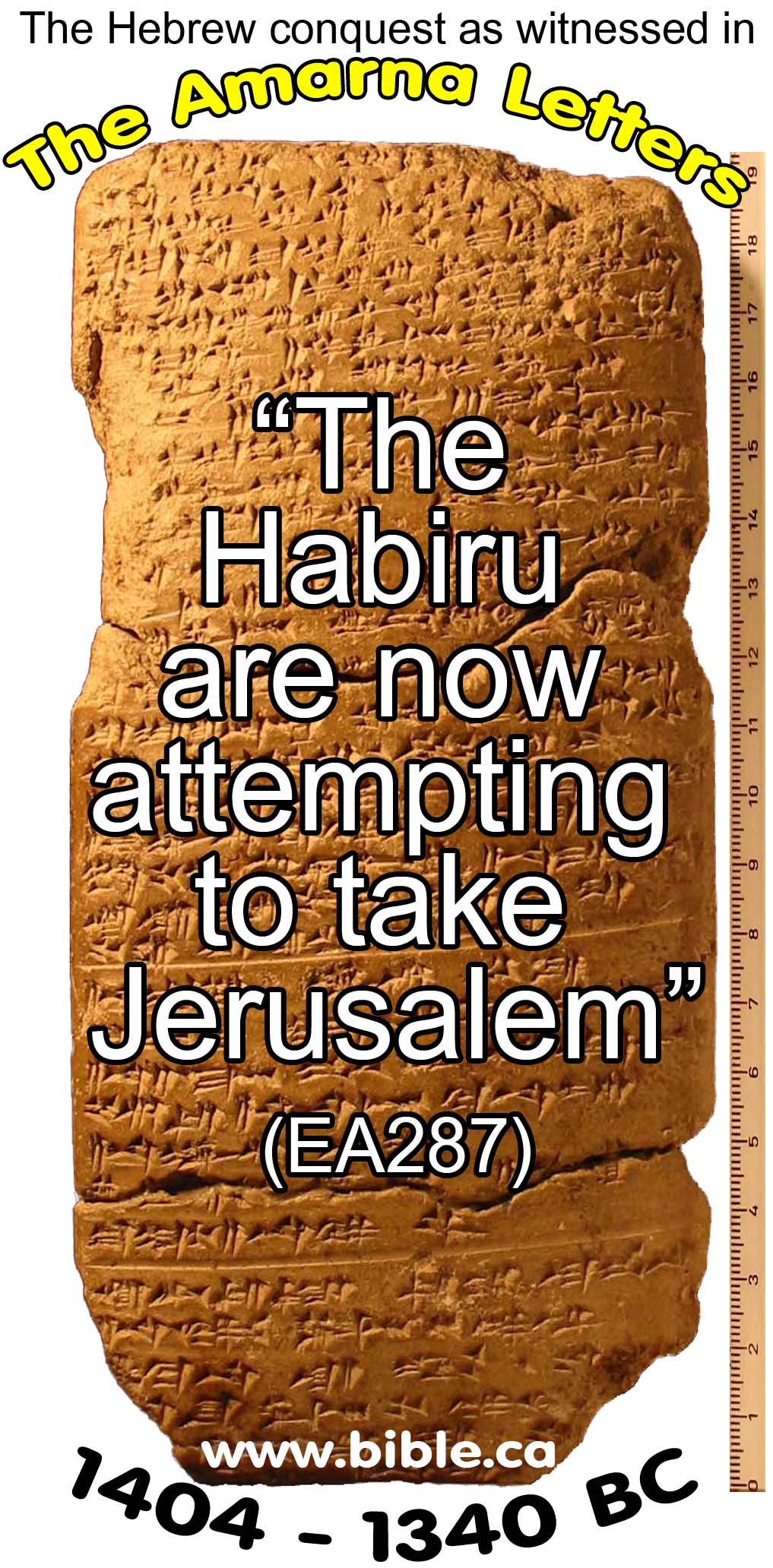
20 Behold, I send an Angel before thee, to keep thee in the way, and to bring thee into the place which I have prepared.
21 Beware of him, and obey his voice, provoke him not; for he will not pardon your transgressions: for my name is in him.
22 But if thou shalt indeed obey his voice, and do all that I speak; then I will be an enemy unto thine enemies, and an adversary unto thine adversaries.
23 For mine Angel shall go before thee, and bring thee in unto the Amorites, and the Hittites, and the Perizzites, and the Canaanites, the Hivites, and the Jebusites: and I will cut them off.
24 Thou shalt not bow down to their gods, nor serve them, nor do after their works: but thou shalt utterly overthrow them, and quite break down their images.
25 And ye shall serve the Lord your God, and he shall bless thy bread, and thy water; and I will take sickness away from the midst of thee.
26 There shall nothing cast their young, nor be barren, in thy land: the number of thy days I will fulfil.
27 I will send my fear before thee, and will destroy all the people to whom thou shalt come, and I will make all thine enemies turn their backs unto thee.
28 And I will send hornets before thee, which shall drive out the Hivite, the Canaanite, and the Hittite, from before thee.
29 I will not drive them out from before thee in one year; lest the land become desolate, and the beast of the field multiply against thee.
30 By little and little I will drive them out from before thee, until thou be increased, and inherit the land.
31 And I will set thy bounds from the Red sea even unto the sea of the Philistines, and from the desert unto the river: for I will deliver the inhabitants of the land into your hand; and thou shalt drive them out before thee.
32 Thou shalt make no covenant with them, nor with their gods.
33 They shall not dwell in thy land, lest they make thee sin against me: for if thou serve their gods, it will surely be a snare unto thee.
Praise The Lord JESUS CHRIST!!!
The 382 Amarna Tablets of the Hebrew Conquest
"They are digging up Bible stories" (again)
1404 - 1340 BC
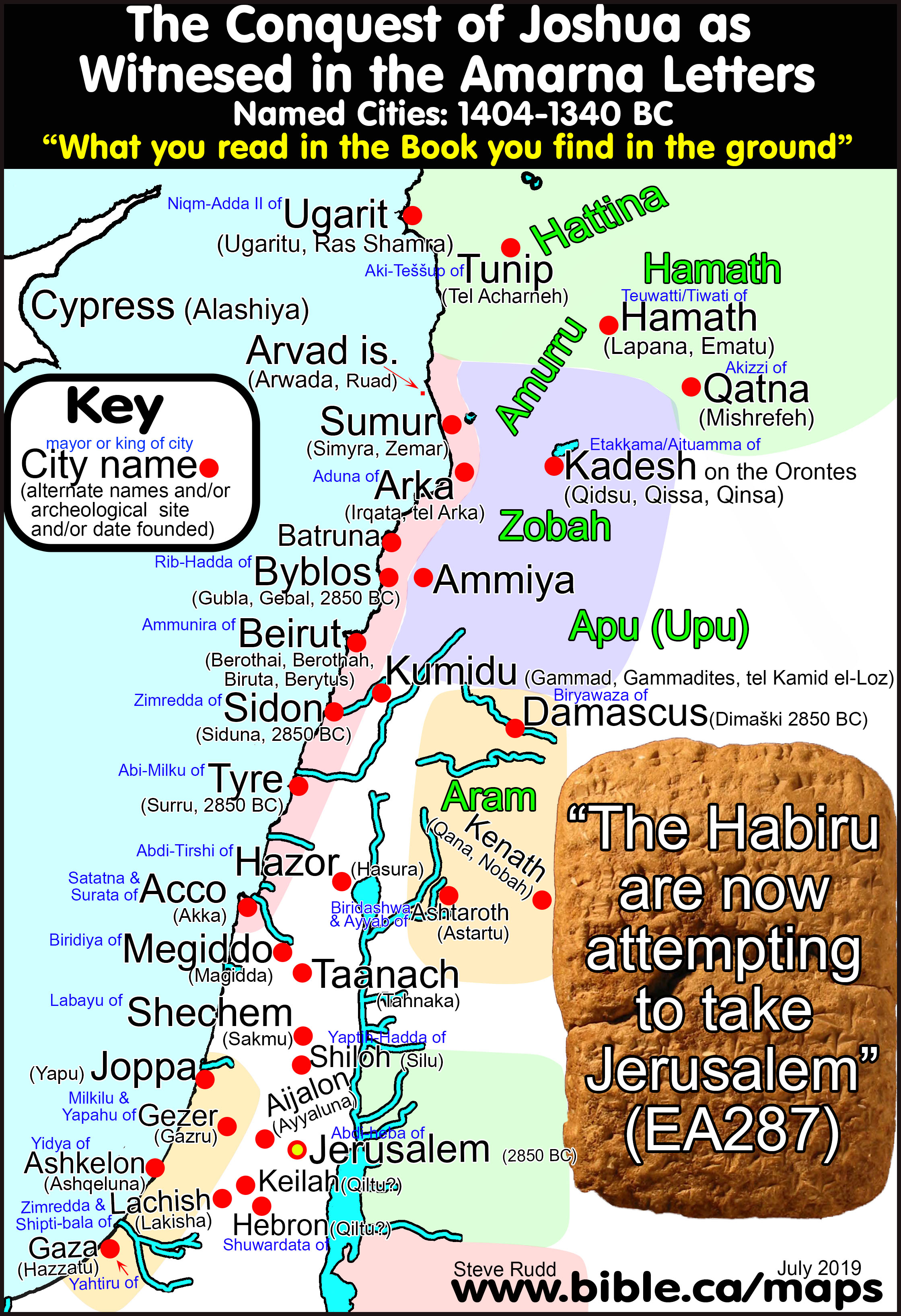
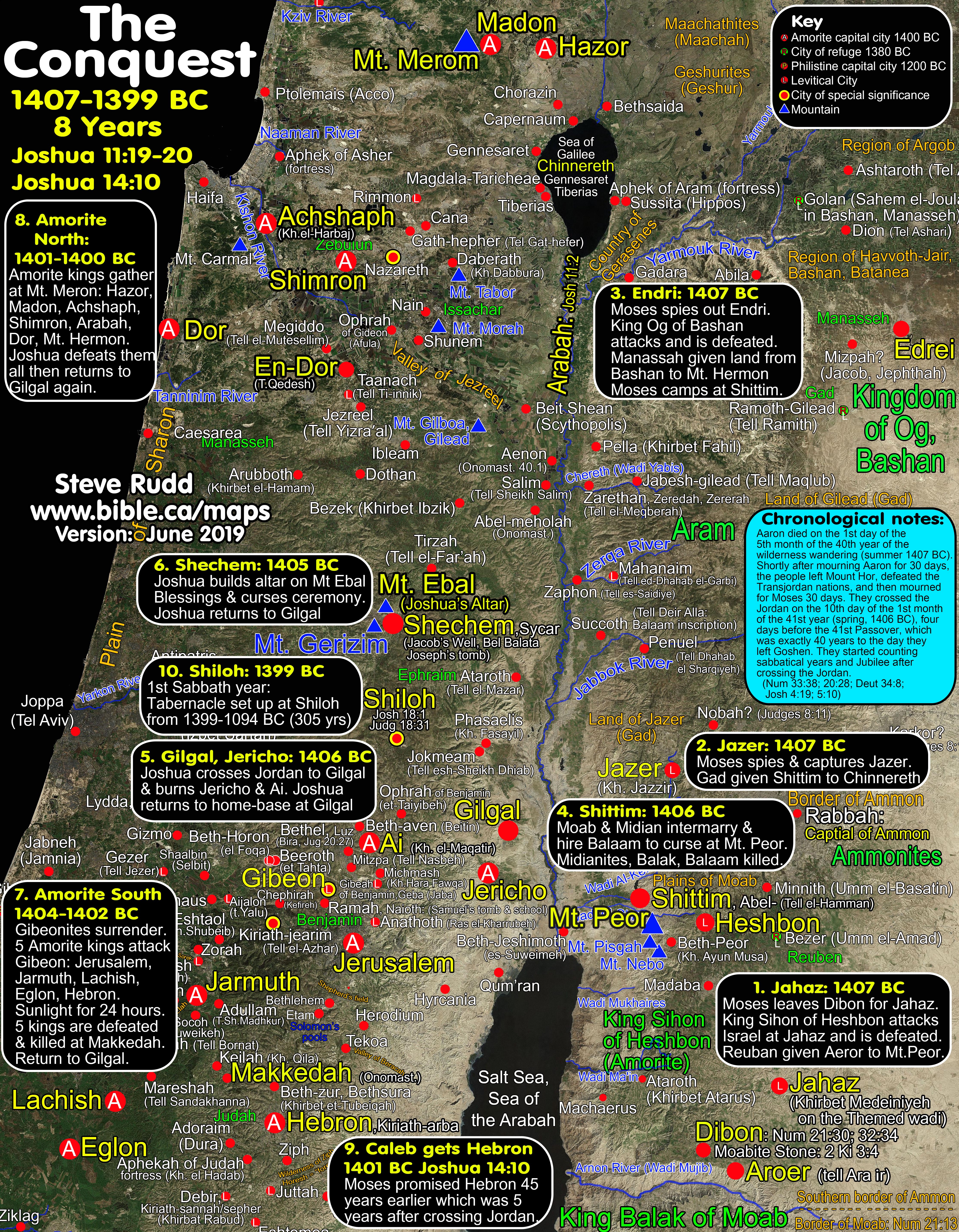
The Chronology of Hebrew Conquest as seen in the Amarna Tablets
Introduction:
Introduction:
- The 382 Amarna Letters represent one of the greatest archeological proofs that the history of the Bible and the conquest under Joshua of the promised land is true.
- It really bothers me that preachers are hesitant to make a connection with Apiru = Hebrew because atheistic, Bible hating archeologists and university professors say such a connection is wrong. If these preachers knew the negative anti-bible bias of the ones causing them doubt and hesitation, they would essentially not ignore this stunning proof of Bible history confirmed by archeology!
- In fact, there are many examples of these anti-Christians arranging and presenting archeological history in a way that is as most dissimilar to the Bible account of history as possible. These are the men who deny David or Solomon ever lived, that no bible book was written earlier than 450 BC and that the exodus, conquest and kingdoms of David are myths invented by Jews 1000 years after they are supposed to happen.
- Spelling the ThutMOSES 18th dynasty of pharaohs as "Thutmosis" or "Thothmes" in an effort to remove the name of MOSES from the name to break the obvious connection with Moses as one of the adopted children of the 18th dynasty pharaohs.
- Translating the cuneiform of the Amarna tablets as "Apiru" as opposed to the other equally correct word choice of "Habiru" because "Apiru" is most unlike "Hebrew", whereas "Habiru" is quite similar to "Hebrew".
- Choosing to arrange the 382 Amarna by numbering them 1-382, where 1 is in the north and 382 is in the south. The conquest happened south to north and if I had my way, I would renumber them the other way so the basic sequence of numbers matches the events of the conquest in the book of Joshua.
- The Hebrew conquest of Canaan under the command of Joshua took exactly eight years to complete (1407-1399 BC) but it wasn't until 1404 BC that Joshua began the conquest of southern Israel, followed by the conquest of northern Israel.
- Aaron died on the 1st day of the 5th month of the 40th year of the wilderness wandering (summer 1407 BC). Shortly after mourning Aaron for 30 days, the people left Mount Hor, defeated the Transjordan nations, and then mourned for Moses 30 days. They crossed the Jordan on the 10th day of the 1st month of the 41st year (spring, 1406 BC), four days before the 41st Passover, which was exactly 40 years to the day they left Goshen. They started counting sabbatical years and Jubilee after crossing the Jordan. (Num 33:38; 20:28; Deut 34:8; Josh 4:19; 5:10)
- From Josh 14:10 we know that Caleb was given Hebron 45 years after Moses promised it to him. This corresponded with year 5 after crossing the Jordan in 1406 BC. Caleb possessed Hebron in 1401 BC.
- “Now behold, the Lord has let me live, just as He spoke, these forty-five years, from the time that the Lord spoke this word to Moses, when Israel walked in the wilderness; and now behold, I am eighty-five years old today." (Joshua 14:10)
- The Habiru (also spelled Apiru) are the Hebrews under the command of Joshua who are attacking the ones who are writing the Amarna Tablets.
- The etymology of "Hebrew" is "one who wanders", "a wanderer", "a Bedouin". Etc.
- This is exactly what the word Habiru means in the Amarna tablets.
- The first time the word Hebrew is used in the Bible, is in Gen 14 when it is applied to "Abraham the Hebrew [wanderer]".
- While Bible scoffers and atheists refuse to make the connection of Habiru with Hebrew, they are in blind denial. Of the two spellings, these Bible haters even chose the spelling of Apiru as opposed to Habiru, because it looks and sound UNLIKE Hebrew.
- Let the Christian be quite reassured with no doubts, that the Amarna tablets are about the Hebrews taking possession of the land of Canaan shortly after they crossed the Jordan under the command of Joshua.
- The Amarna tablets are a second record of the conquest from Egyptian and Canaanite cuneiform tablets written in Akkadian Babylonian.
- The Amarna tablets are a stunning secular witness to the power of God and the truthfulness of the bible's historical record.
I. Akhenaten's conversion a stunning marker in history:
- The Amarna Tablets not only document the conquest, but also highlight the conversion of Akhenaten to pagan monotheism.
- Akhenaten was very aware of the power of the Hebrew God which demanded monotheistic worship.
- the 10 plagues that destroyed Egypt
- the crossing of the Red Sea (Straits of Tiran) which decimated Egypt's military power
- the miracles at Mt. Sinai in modern Saudi Arabia. (Mt. Lawz)
- the invincible takeover of Caanan in the conquest.
- All of this made it clear that the monotheistic God of the Hebrews was superior to the pantheon of Egyptian polytheism.
- Akhenaten could clearly see that monotheism was superior to polytheism.
- Akhenaten's conversion to monotheism (sun worship) is a stunning marker unparalleled in history and only the conquest of the Hebrews in Canaan can account for it.
- Akhenaten's conversion to monotheism and the record of the Amarna Tablets of the conquest, is the elephant in the room that Bible-trashers and atheists refuse to acknowledge as one of the most obvious archeological proofs that the Bible is a true record of history.
II. Content of the Amarna Letters:
- "Of the 382 tablets, only 32 are not letters or inventories attached to letters. The content of this small group is quite diverse. Some belong in the Mesopotamian scribal tradition: myths and epics (EA 340?, 356–59, 375?), syllabaries (EA 348, 350, 379), lexical texts (EA 351–54, 373), a god-list (EA 374). On one is a tale of Hurrian origin (EA 341); on another (EA 368), an unparalleled list of Egyptian words written in syllabic cuneiform with equivalences in Babylonian written either syllabically or logographically. One tablet is perhaps an amulet (EA 355). The genres of the other 14 (EA 342–47, 349, 360–61, 372, 376–77, 380–81), which are often very fragmentary, remain to be determined. … With the exception of EA 15 (Assyrian), EA 24 (Hurrian), and EA 31–32 (Hittite), the language of the Amarna letters is Babylonian, but for the most part it is a Babylonian profoundly different from that of the previous international age. It reflects many of the developments that one finds in the “good" Middle Babylonian language of the letters from Babylonia itself " (The Amarna letters, W. L. Moran, introduction, 1992 AD)
III. Timing of the Amarna Letters happened when these three kings were alive: 1404-1340
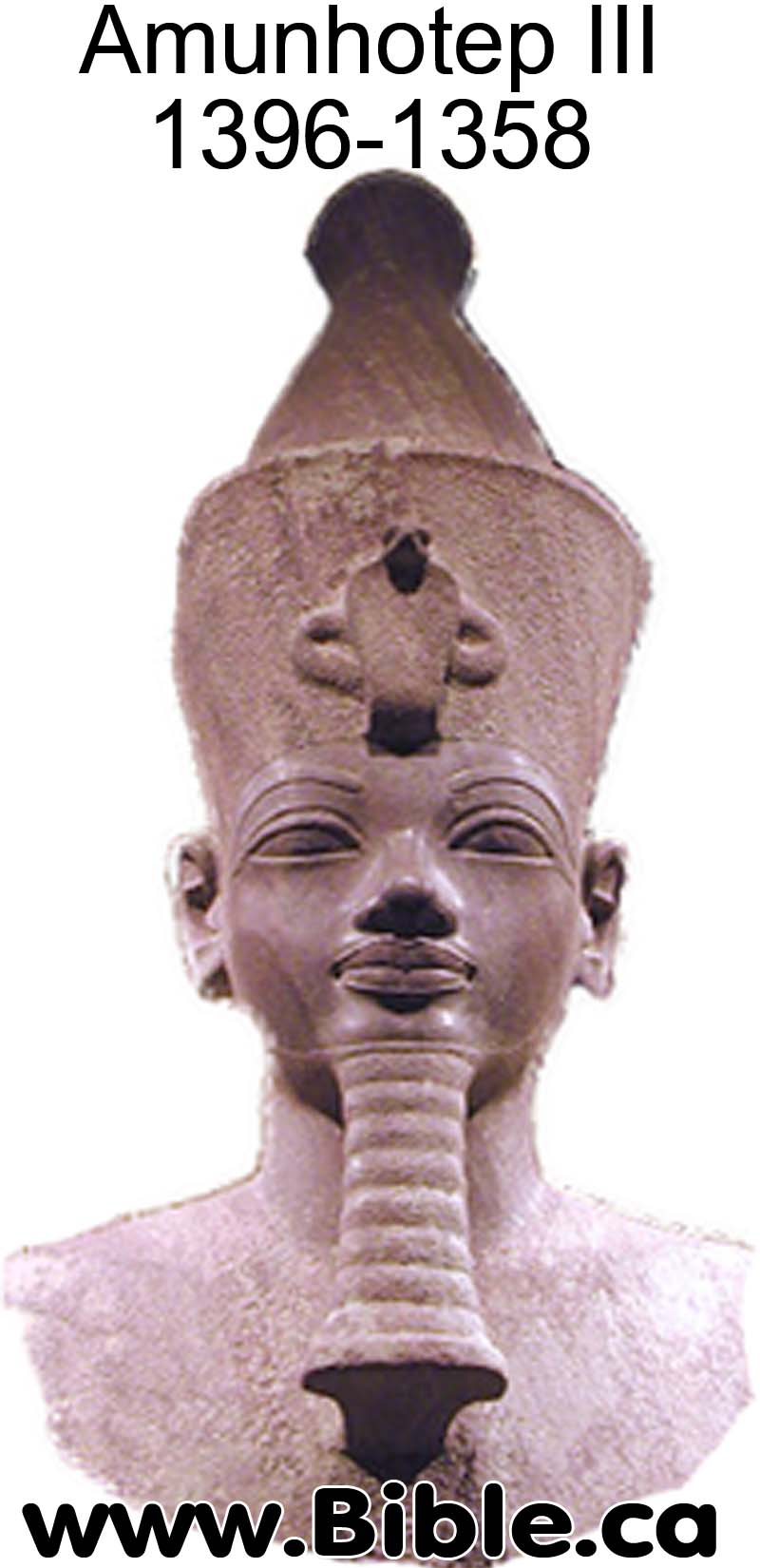 | 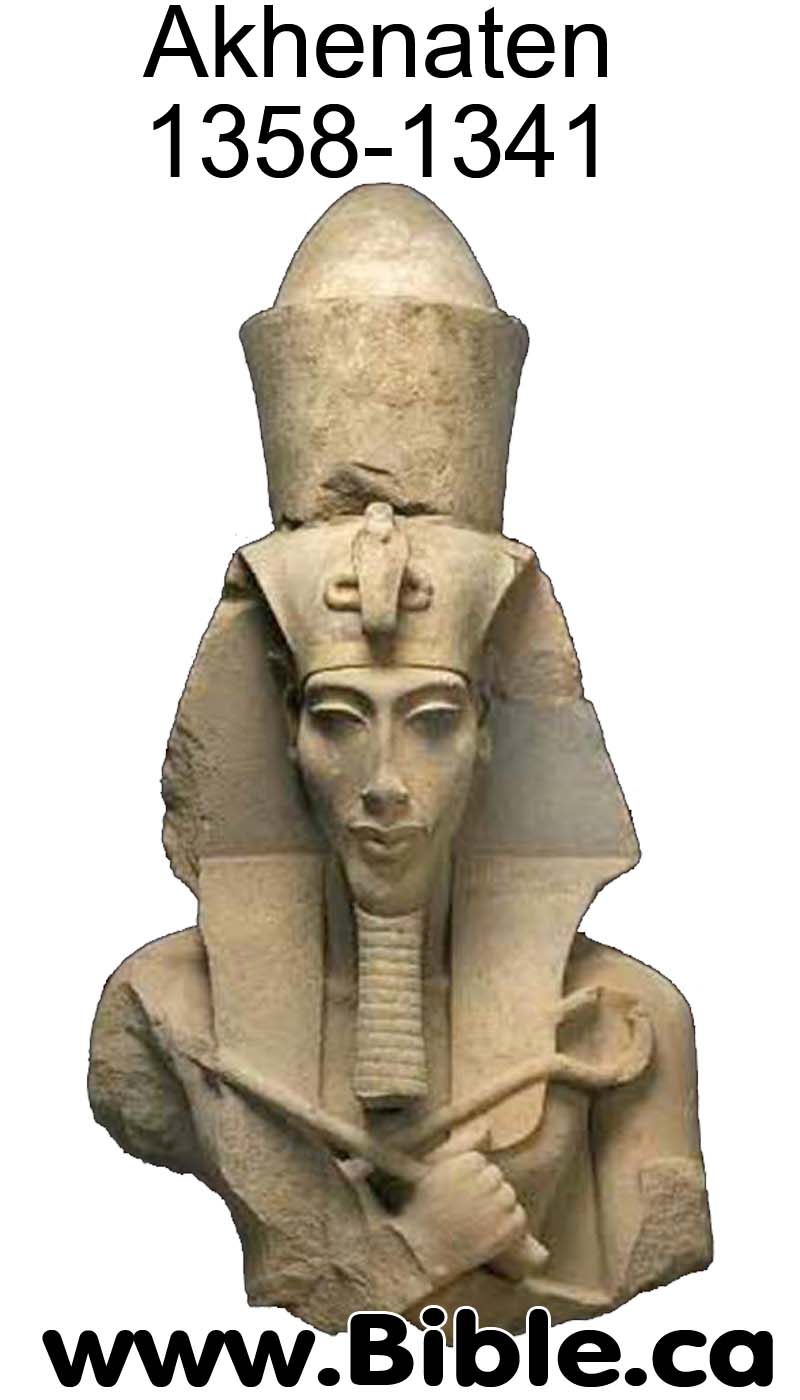 | 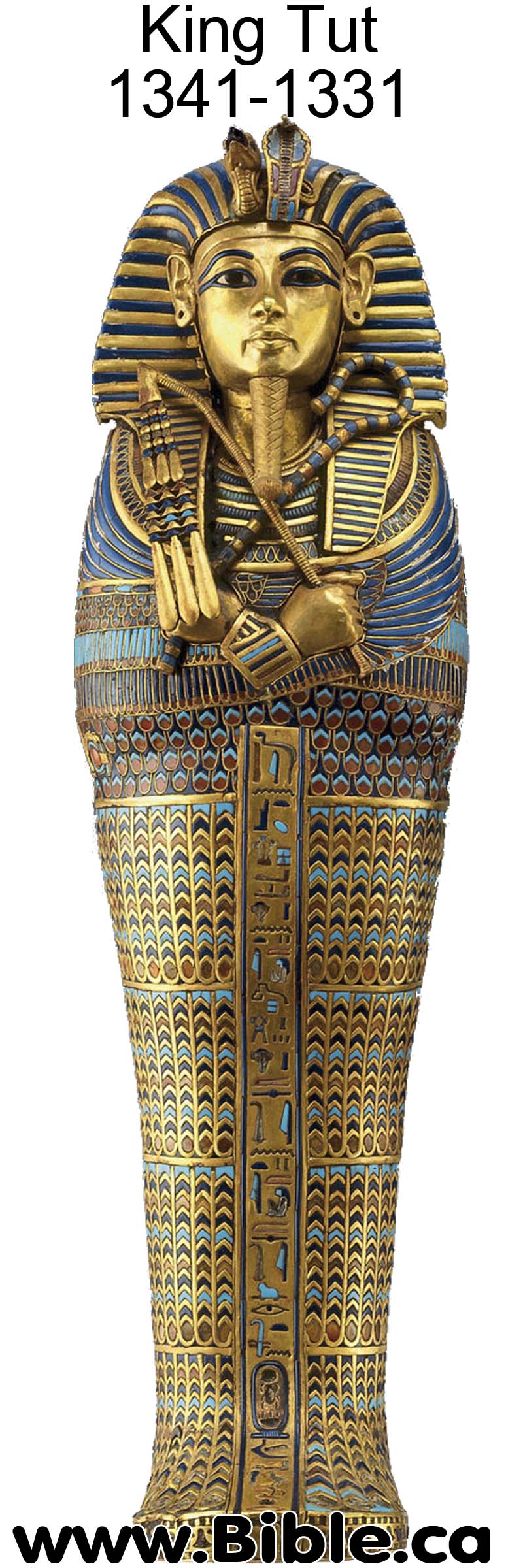 |
- A broader date for the Amarna tablets is 1404 - 1340 BC (64 years). They cannot be any earlier than the beginning of the conquest of the Judah (1404 BC) or any later when Amarna was destroyed in the second year of King Tut (1340 BC). These dates represent the outer limits and the actual period of the Amarna letters is likely shorter than 64 years.
- Many of the Amarna letters were written before Akhenaten built Amarna and before he became Pharaoh.
- Based upon the names, places and events in the tablets, it is clear that the letters are written as early as Amunhotep III, who was pharaoh starting in 1396 BC. Since King Tut destroyed Amarna in the second year of his reign, the last Amarna letter to be written cannot be dated any later than 1340 BC. It was at this time that the collection of letters were buried and sealed in time till they were discovered in 1887 AD.
- "The Amarna archive, it is now generally agreed, spans at most about thirty years, perhaps only fifteen or so. The extremes depend on the number of years, if any, one assigns to the co-regencies of Amenophis IV with Amenophis III, and of Smenkhkare with Amenophis IV. The longer the co-regencies, the shorter the period. The archive begins about the thirtieth year of Amenophis III and extends no later than the first year or so of Tutankhamun, at which time the court abandoned the site of Akhetaten. The upper limit is suggested, first of all, by the hieratic docket on EA 23, which dates the reception of this letter in the thirty-sixth year of Amenophis III. Then, by inference from internal evidence, EA 17, 19–21, and 24–25 fit into the previous five years or so. The Babylonian correspondence with Amenophis III also fits well into his last years, and in general, nothing in the archive argues clearly for an earlier date. (The Amarna letters, W. L. Moran, introduction, 1992 AD)
- The chronology of the 18th dynasty of Egyptian Pharaohs is very uncertain because it is difficult if not impossible to determine if and when coregencies occurred.
- The kings of Israel and Judah often had coregencies as a way of solidifying the dynasty and strengthening the hold on power.
- Egyptian dates for Sheshask who invaded Israel in the 5th year of Rehoboam's reign are determined using Bible chronology. That's right! The bible is viewed as the most reliable historical document to date Egyptian dynasties etc.
- It is certain that Akhenaten lived at the exact same time as Joshua. In fact, since Joshua died in 1356 BC when the great land battles had ceased and the indigenous population had been conquered, it seems likely that Akhenaten's 17 year reign should be adjusted a 15 years earlier to coincide with the death of Joshua. This would give a reign for Akhenaten of 1373-1356 BC.
- Akhenaten's reign is best aligned with the last years of Joshua rather than the beginning of the conquest in 1404 BC because it needed to be clear to Akhenaten that the monotheism of the Hebrews was superior to the Egyptian polytheism. Akhenaten's conversion to monotheism (sun worship) is a stunning marker unparalleled in history and only the conquest of the Hebrews in Canaan can account for it.
- The best date range, therefore, for the Amarna Letters is the last years of Amunhotep III and all the reign of Akhenaten.
- This should not surprise us, since the letters were found in Amarna, a city built after Akhenaten became pharaoh.
- Many of the letters make clear references to sun worship, which was the monotheism of Akhenaten.
Thutmoses III
1485-1431
Pharaoh of the Exodus
Amenhotep II
1431-1406
Died at start of conquest
Thutmoses IV
1406-1396
Began to reign at start of conquest
Amunhotep III
(Amenophis III)
1396-1358
Conquest underway
Akhenaten
(Amenophis IV)
1358-1341
Began to reign the year Joshua died (monotheism)
King Tut
(Tutankhamun)
1341-1331
Reverted back to polytheism, destroyed Amarna in 1340
Note: All dates have been shifted six years earlier from the standard low chronology to align the 17th year of Thutmoses III with the exodus in 1446 BC.
- Its quite possible that Akhenaten's father had converted to sun worship before he died and it was Akhenaten who enforced it upon the empire!
- If this is the case, it clearly parallels David conceiving the idea of a temple in Jerusalem and Solomon his son, building it.
- The main reason why they restrict the dating for the Amarna tablets to Akhenaten is because of the obvious references to sun worship!
- If there was a "father/son" conversion to monotheistic sun worship, it would extend the date back to the earliest years of the conquest. (1396 BC)
- Given unaccounted for coregencies of all 18th dynasty pharaoh's and the possible conversion of Amunhotep III to monotheism which came to full flower under his son Akhenaten, the Amarna tablets might in fact date back to the very beginning of the exodus in 1404 BC. (1404 BC was the date they began the southern conquest of Judah).
IV. Akhenaten's conversion to monotheism inspired by the Hebrew exodus and conquest:
1. Akhenaten’s Monotheism is Historic!!! Like a stunning marker in time, the only possible explanation for Akhenaten change the centuries old religion of Egypt to monotheism, is the triumph of the monotheistic Hebrews over Egypt in the exodus and conquest.
a. Moved capital from Thebes to Amarna
b. Fired all the priests and started a new religion like Jeroboam
c. Pagan monotheism of sun worship.
2. Both Akhenaten and Muhammad chose one god from many gods that were being worshipped at the time and then elevated that one god to be worshipped to the exclusion of all others. Akhenaten called his god "Aten", Muhammad called his god "Allah". While these religions of monotheism had their origin in pagan idol worship in the day they were invented. Islam is pagan monotheism of “sanitized” moon worship of Allah.
3. In the photo below, we have Akhenaten with his wife Nefertiti, his child under the sun god "Aten" whose rays of blessing are showering down upon them.
V. Master Encyclopedia index & listing of Amarna city names, mayors, kings and people:
- People of special interest in the Amarna Tablets:
- Habiru, (also spelled Apiru) are the Hebrews under the command of Joshua. The etymology of "Hebrew" is "one who wanders", "a wanderer", "a Bedouin". Etc. This is exactly what the word Habiru means in the Amarna tablets. The first time the word Hebrew is used in the Bible, is in Gen 14 when it is applied to "Abraham the Hebrew [wanderer]". While Bible scoffers and atheists refuse to make the connection of Habiru with Hebrew, they are in blind denial. Of the two spellings, these Bible haters even chose the spelling of Apiru as opposed to Habiru, because it looks and sound UNLIKE Hebrew.
- Abdi-Asirta is a non-Hebrew man who joins/supports/supplies/sympathizes with the Habiru (Hebrews). Abdi-Asirta calls for the townsfolk to rise up and kill the mayor of their city and become allied with the Jews.
- Aziru is the son of Abdi-Asirta, who takes over the vacuum of command when his father is killed. He continues to work against the Egyptian allied city mayors just like his father.
- Yanhamu is a district overseer of the entire area appointed by pharaoh. He is like a governor or premier of the province.
- Suteans are mercenaries who will fight for anyone for money. They are mentioned in 8 of the Amarna Tablets.
- Regions, territories and provincial areas mentioned in the Amarna Tablets:
- Hattina
- Hamath
- Amurru
- Zobah
- Apu (Upu)
- Aram
- Alphabetic listing of cities and mayors:
- To make it easy for the Bible student we have created an alphabetic listing of Bible city names.
- There are several different names for each city.
- Some of the Amarna Letters indicated the person who wrote the letter but not the city he is located in.
- Conversely, a city is named without any reference to the author of the clay tablet.
- You can use "control + F" to search for any name on this page.
Bible city name
|
Amarna city name
|
City mayor/king
|
Acco
|
Akka
|
Satatna & Surata
|
Aijalon
|
Ayyaluna
| |
Ammiya
| ||
Arka
|
Irqata
|
Aduna
|
Arvad Island
|
Arwada, Ruad
| |
Ashkelon
|
Ashqeluna
|
Yidya
|
Ashtaroth
|
Astartu
|
Biridashwa & Ayyab
|
?
|
Batruna
|
?
|
Berothai, Berothah
|
Beirut, Biruta, Berytus
|
Ammunira
|
Cypress
|
Alashiya
| |
Damascus
|
Dimaški
|
Biryawaza
|
Gammad
|
Kumidu, Gammadim, Gammatites
| |
Gaza
|
Hazzatu
|
Yahtiru
|
Gebal
|
Byblo, Gubla
|
Rib-Hadda
|
Gezer
|
Gazru
|
Milkilu & Yapahu
|
Hamath
|
Lapana, Ematu
|
Teuwatti/Tiwati
|
Hazor
|
Hasura
|
Abdi-Tirshi
|
Hebron
|
Qiltu (might be Keilah)
|
Shuwardata
|
Jerusalem
|
Jerusalem
|
Abdi-heba
|
Joppa
|
Yapu
| |
Kadesh on the Orontes
|
Qidsu, Qissa, Qinsa
|
Etakkama/Aituamma
|
Keilah
|
Qiltu (Might be Hebron)
|
Shuwardata
|
Kenath
|
Qana, Nobah
| |
Lachish
|
Lakisha
|
Zimredda & Shipti-bala
|
Megiddo
|
Magidda
|
Biridiya
|
Qatna
|
Mishrefeh
|
Akizzi
|
Shechem
|
Sakmu
|
Labayu
|
Sidon
|
Siduna
|
Zimredda
|
Shiloh
|
Silu
|
Yaptih-Hadda
|
Sumur
|
Simyra, Zemar
| |
Taanach
|
Tahnaka
| |
Tunip
|
Tunip
|
Aki-Teššup
|
Tyre
|
Surru
|
Abi-Milku
|
Ugarit
|
Ugaritu
|
Niqm-Adda II
|
?
|
Muhhazu
|
?
|
VI. The gallery of the Amarna Tablets:
1. The photo of each Amarna Letter is an actual photo of that tablet. However in a number of cases, no photo was available, so we substituted a different Amarna Tablet photo.
2. The text overlaid on each tablet is sometimes a paraphrase that is accurate to the original message.
3. The order that the tablets are arranged below tells a very fascinating story and read like a novel.
4. The tablets are arranged on a geographical basis that is opposite to the Bible story.
- In the conquest, Joshua took the south then moved north.
- Our story arranges the tablet starting in the north and moving south.
- The reason for this, is that the man who chose the original sequence of numbers starting at EA1 chose to start at the north and move south with higher numbers.
- Byblos = Gebal = Gebalites: About a third of the tablets were written by Rib-Hadda, the mayor/king of Byblos (biblical Gebel).
- “and the land of the Gebalites, and all Lebanon, toward the east, from Baal-gad below Mount Hermon to Lebo-hamath," (Joshua 13:5)
- “So Solomon’s builders and Hiram’s builders and the Gebalites did the stonecutting and prepared the timber and the stone to build the house." (1 Kings 5:18)
- “The elders of Gebal and its artisans were within you, caulking your seams; all the ships of the sea with their mariners were within you, to barter for your wares." (Ezekiel 27:9)
- Key full text translation of each Amarna tablet by W. L. Moran "The Amarna letters", 1992 AD. This is the key to the free on-line translation of the Amarna Letters:
- [ ] restored text
- [ … ] missing text
- … obscure or greatly damaged text
- ‹ › omission by scribe
- « » sign(s) repeated by error
- ( ) word(s) supplied by editor to clarify text
- boldface numbers: line numbers
- italics: translation doubtful
- centered colon: indication of a gloss (the gloss is translated only if it has a different meaning from the word glossed; glosses in Akkadian are not indicated)
Welcome to the Amarna Tablet Museum and free gallery
| |
Amarna Letter EA68
Storyline: Rib-Hadda, the mayor of Byblos warns pharaoh that the city of Sumur will be lost to the Hebrews.
Paraphrase of Tablet: "From Rib-Hadda mayor of Byblos (Gebal): King of all countries, Great King Pharaoh: The war of the Habiru forces is extremely severe, do not neglect Sumur lest all be joined to the Habiru."
Full text translation of Tablet:
"[R]ib-Hadd[a sa]ys to his lord, [king] of all countries, Great King: May the Lady of Gubla grant power to the king, my lord. 7–11 I fall at the feet of my lord, my Sun, 7 times and 7 times. May the king, my lord, know that Gubla, the loyal maidservant of the king, is safe and sound. 12–18 The war, however, [o]f the ˓Apiru forces [aga]inst me is extremely severe, and so may the king, my lord, not ‹ne›glect Ṣumur lest ever[yo]ne be joined to the ˓Apiru forces. 19–26 Through the king’s commissioner who is in Ṣumur, Gubla is alive. Paḫa[mna]ta, the commissioner of the king who is in Ṣumur, knows the straits: ma-na-AŠ (?) that Gubla is in. 27–32 It is from the land of Yarimuta that we have acquired provisions. The w[a]r [agai]nst us is extremely severe, and so may the king not [ne]glect his [ci]ties." (The Amarna letters, W. L. Moran, introduction, 1992 AD, EA 68)
| |
Amarna Letter EA76
Storyline: Rib-Hadda's warning went unheeded and Sumur is lost to the Hebrews and begs for pharaoh to send archers to help defend the city.
Paraphrase of Tablet: "From Rib-Hadda mayor of Byblos (Gebal): Sumur, your garrison-city, have joined the Habiru, and you have done nothing. Send a large force of archers."
Full text translation of Tablet:
"Rib-Hadda says to the king of all countries, Great King, King of Battle: May the Lady of Gubla grant power to the king, my lord. I fall at the feet of my lord, my Sun, 7 times and 7 times. 7–16 May the king, my lord, know that the war of ˓Abdi-Aširta against me is severe. [H]e wants to take [for himself] the two cities that have remained to me. [Mo]reover, what is ˓A[bdi]-Aš[ir]ta, the dog, that he strives to [ta]ke all the cities of the king, the Sun, [fo]r himself? Is he the king of Mittana, or the king of Kaššu, that [h]e strives to take the land of the king for himself? 17–29 He has just gathered together all the ˓Apiru against Šigata [and] Ampi, and [h]e himself has taken these two cities. [I s]aid, “There is no place where [me]n can enter against him. He has seized [ … ] … .,3 [so] send me [a garris]on of 400 men a[nd x pairs of h]orses [with all speed."It] is [thus that I keep writing to the pal]ace, but [you do not rep]ly [to m]e. 30–37 [ … ] … For years archers would come out to inspect [the coun]try, and yet now that the land of the king and Ṣumur, your garrison-city, have been joined to the ˓Apiru, you have done nothing. 38–46 Send a large force of archers that it may drive out the king’s enemies and all lands be joined to the king. Moreover, you are a great lord. You must not neglect this message." (The Amarna letters, W. L. Moran, introduction, 1992 AD, EA 76)
| |
Amarna Letter EA71
Storyline: Rib-Hadda, mayor of Byblos, warns of a non-Hebrew traitor named Abdi-Aširta, who is working against pharaoh's interests in Canaan and helping the Hebrews. A request for 100 horses and 200 troups is made of pharaoh in Egypt to help.
Paraphrase of Tablet: "From Rib-Hadda mayor of Byblos (Gebal): Abdi-Aširta is a servant & dog who takes the king's land for himself. Through the Habiru his auxiliary force is strong! Send 100 horses and 200 men that I may resist Abdi-Aširta."
Full text translation of Tablet:
"[To] Ḫaya, the vizi[er]: Message of Rib-Hadda. I fal[l] at your feet. May Aman, the god of the king, [ylour lord, establish2 your honor in the presence of the king, your lord. 7–16 You are a wise man; the king knows (this) and because of your wis‹d›om he sent you as commissioner. Why have you been negligent, not speaking to the king so he will send archers to take Ṣumur? 16–22 What is ˓Abdi-Aširta, servant and dog, that he takes the land of the king for himself? What is his auxiliary force that it is strong? Through the ˓Apira his auxiliary force is strong! 23–27 So send me 50 pairs of horses and 200 infantry that I may resist him in Šigata until the coming forth of the archers. 28–35 Let him not gather together all the ˓Apiru so he can take Šigat[a] and Ampi, and [seize … ] … What shall I be able to d[o]? There will be no place where [men] can enter against [him]." (The Amarna letters, W. L. Moran, introduction, 1992 AD, EA 71)
| |
Amarna Letter EA73
Storyline: Rib-Hadda, mayor of Byblos, warns that the traitor named Abdi-Aširta, is telling the people of each city to rise up and kill their city mayor and become allied with the Hebrews. In this case pharaoh is warned that the town of Ammiya, near Byblos, is at risk of such an insurrection.
Paraphrase of Tablet: "From Rib-Hadda mayor of Byblos (Gebal): Abdi-Aširta sent a message to the men of Ammiya, ‘Kill your city mayor and join the Habiru."
Full text translation of Tablet:
"To Amanappa, my father: Message of Rib-Hadda, your son. I fall at the feet of my father. May the Lady of Gubla establish your honor in the presence of the king, your lord. 6–11 Why have you been negligent, not speaking to the king, your lord, so that you may come out together with archers and fall upon the land of Amurru? 11–16 If they hear of archers coming out, they will abandon their cities and desert. Do not you yourself know that the land of Amurru follows the stronger party? 17–25 Look, they are not now being friendly to ˓Abdi-Aširta. What will he do to them? [And so] they are longing2 day and night for the coming out of the archers, and ‹they say›, “Let us join them!"All the mayors long for this to be done to ˓Abdi-Aširta, 26–33 since he sent a message to the men of Ammiya, “Kill your lord and join the ˓Apiru."Accordingly, the mayors say, “He will do the same thing to us, and all the lands will be joined to the ˓Apiru."33–38 Report this matter in the presence of the king, your lord, for you are father and lord to me, and to you I have turned. 39–45 You know my conduct when you were in [Ṣ]umur; I am your [l]oyal servant. So speak to the king, [your] lord, that an auxiliary force be [s]en‹t› t[o] me with all speed." (The Amarna letters, W. L. Moran, introduction, 1992 AD, EA 73)
| |
Amarna Letter EA74
Storyline: Rib-Hadda, mayor of Byblos, warns of a non-Hebrew traitor named Abdi-Aširta has successfully convinced the townsfolk of Ammiya to kill their mayor and join the Hebrews. Notice that the expression, "bird in a trap" is similar to what Sennacherib said of Hezekiah in the "Sennacherib's Annals" when he attacked Jerusalem: " I shut up in Jerusalem, his capital city, like a bird in a cage".
Paraphrase of Tablet: "Abdi-Aširta said to the men of Ammiya, ‘Kill your leader and live in peace like us’ They were won over & the entire country joined to the Habiru. I am very, very afraid, since no one will save me from them. I, Rib-Hadda, am like a bird in a trap in Byblos."
Full text translation of Tablet:
"Rib-Hadda says to [his] lord, king of all countries, Great King, King of Battle:2 May [the Lady] of Gubla grant power to the king, my lord. I fall at the feet of my lord, my Sun, 7 times and 7 times. 5–10 May the king, the lord, know that Gubla, the loyal maidservant of the king since the days of his ancestors, is safe and sound. The king, however, has now withdrawn his support of his loyal city. 10–12 May the king inspect the tablets of his father’s house (for the time) when the ruler in Gubla was not a loyal servant. 13–19 Do not be negligent of your servant. Behold, the war of the ˓Apiru against ‹me› is severe and, as the gods of y[our] land [are ali]ve, our sons and daughters (as well as we ourselves) are gone since they have been sold in the land of Yarimuta for provisions to keep us alive. “For lack of a cultivator, my field is like a woman without a husband.”6 19–22 All my villages that are in the mountains: ḫa-ar-ri or along the sea have been joined to the ˓Apiru. Left to me are Gubla and two towns. 23–30 After taking Šigata for himself, ˓Abdi-Aširta said to the men of Ammiya, “Kill your leader and then you will be like us and at peace."They were won over, following his message, and they are like ˓Apiru.8 30–38 So now ˓Abdi-Aširta has written to the troops: “Assemble in the temple of NINURTA,10 and then let us fall upon Gubla. Look, there is no one that will save it from u[s]. Then let us drive out the mayors from the country that the entire country be joined to the ˓Apiru, … to the entire country. Then will (our) sons and daughters be at peace forever.39–45 Should even so the king come out, the entire country will be against him and what will he do to us?"Accordingly, they have made an alliance among themselves and, accordingly, I am very, very afraid, since [in] fact there is no one who will save me from them. 45–50 Like a bird in a trap: ki-lu-bi (cage), so am I in Gubla. Why have you neglected your country? I have written like this to the palace, but you do not heed my words. 51–57 Look, Amanappa is with you. Ask him. He is the one that knows and has experienced the stra[its] I am in. May the king heed the words of his servant. May he grant provisions for his servant and keep his servant alive so I may guard his [lo]yal [city], along with our L[ad]y (and) our gods, f[or you]. 57–62 May [the king] vis[it] his [land] and [his servant]. [May he] give thought to his land. Pac[ify yo]ur [land]! May it seem go[od] in the sight of the k[ing], my [lo]rd. May he send a [ma]n of his to stay this time so I may arri[ve] in the presence of the king, my lord.62–65 It is good for me to be with you. What can I do by [my]self? This is what I long for day and night." (The Amarna letters, W. L. Moran, introduction, 1992 AD, EA 74)
| |
Amarna Letter EA121
Storyline: Rib-Hadda, mayor of Byblos, warns of a non-Hebrew traitor named Abdi-Aširta, is about to attack Byblos and is telling everyone that Rib-Hadda is no one to be feared!
Paraphrase of Tablet: "Rib-Hadda mayor of Byblos, (Gebal) to king of all countries, Great King: Abdi-Asirta has said to the Habiru ‘Who is this Rib-Hadda?’ Pharoah, please send archers!"
Full text translation of Tablet:
"Rib-Hadda w[rit]es to his lord, king of all countries, Great King: May the Lady of Gubla grant power to the king, my lord. I fall at the feet of my lord, my Sun, [7] times and 7 times. As to the king, my lord’s, writing me,8–17 “Guard yourself,"what is to g[uar]d [me]? Consider that with my ancestors there was a garrison of [the king], and pro[visions from the k]ing were at th[eir] disposal, but in my case, [there are no pro]visions (or) garrison of the king for [me. 18–25 And] as the war against ‹me› is very severe, the sons of ˓Abdi-Asirta have said to the ˓Apiru and the men who have [jo]ined them, “What is there [wit]h Rib-Hadda?"[So give thou]ght t[o] your [ser]vant and let me tell my [lord] 26–40 … 41–49 [I wr]ote to [the king, my lord, “S]end [archers]."Did they [no]t take [in a day] the lands for the k[ing, your father]? Now, may the king [heed] the words of [his] serva[nt] and send archers to ‹t›a›[ke] "the land of the king for the king, 50–53 that you may give p[ea]ce in the lands to the [king’s] mayors. Have they not been [ki]lled like [do]gs, and you have done nothing? 54–59 Moreover, … 60–64 [S]end … [ … ] If [the king, my lord], love[s] his servant, [then may he fetch his servant] to himself [ … ]." (The Amarna letters, W. L. Moran, introduction, 1992 AD, EA 121)
| |
Amarna Letter EA88
Storyline: Rib-Hadda, mayor of Byblos, warns that a non-Hebrew traitor named Abdi-Aširta, will capture the entire promised land from Byblos down to the Wadi El-Arish (border of Egypt). What an incredible statement! This is exactly what Joshua accomplished!
Paraphrase of Tablet: "From Rib-Hadda mayor of Byblos (Gebal): But if the king does not give heed to my words, then Byblos will be joined to Abdi-Ašrati, and all the lands of the king, as far as Egypt, will be joined to the Habiru."
Full text translation of Tablet:
"[Ri]b-Had[da s]ay[s to his lord: Be]fore the king of all countries, [Great King], a[t the feet of my lord], my Sun, I fall [7] times and 7 times. I have w[ritten] 5–12 repeatedly to y[ou, “The war is against] Ardat, against Irqat, and agai[nst …, an]d Am‹mi›y[a and Šigat]a, loyal [ci]ties of the king”, [but the king], my lord, [has done nothing]. Moreover, what is [he, ˓A]bdi-Ašrati, the servant (and) dog, that he has a[ct]ed as he pleased in the lands of my lord, [and yet] the king, my lord, has done nothing for [his] servant? 13–21 [Moreov]er, I sent my messenger (each time) that [he too]k my cities and moved u[p aga]inst me. [N]ow he has taken Baṭruna, and he has moved up against me. [Behlold the city! He has … the entrance of the gate of Gubla. How long has he not moved from the gate, and so we are unable to go out into the countryside.4 21–28Moreover, look, he strives to seize Gubla!6 And [ … and] may the king, my lord, give heed t[o the words of] his [ser]vant, and [may] he hasten [with] all speed chariots and [troops]8 that they may gu[ard the city of the king], my lord, and [ … until] the arr[iva]l of the king, [my] lor[d]. 28–39 For my part,) I will [no]t neglect the word of [my] lord. But i[f the k]ing, my lord, does [not give heed] to the words of [his] ser[vant], then Gubla will be joined to him, and all the lands of the king, as far as Egypt, will be joined to the ˓Apiru. Moreover, should my lord not have wor[d] brought to hi[s]serv‹ant› by tablet,
with all speed, then … the city to him and I will request a town from him to stay in, and so I will stay al‹iv›e. 40–51 [Moreov]er, may the king, my lord, hasten the troops (and) chariots that they may guard the city of the king, my lord. Look, Gubla is not like the [other] cities; Gubla is a loyal city of the king, [my] lo[rd], from most ancient times. Still, the messenger of the king of Akka is honored more than [my] messeng[er], f[or they fur]nished [h]im with a horse. [May he furn]ish him (my messenger) … with 2 horses. May he not come out [empty-handed]." (The Amarna letters, W. L. Moran, introduction, 1992 AD, EA 88)
| |
Amarna Letter EA77
Storyline: Rib-Hadda, mayor of Byblos, warns that Byblos will be lost to the Hebrews and he is afraid for his life from his own townsfolk who might rise up and kill him!
Paraphrase of Tablet: "From Rib-Hadda mayor of Byblos: If no archers come out, all lands will be joined to the Habiru. I’m afraid the residents of Byblos will strike me down."
Full text translation of Tablet:
"To Ama[nappa, my father]: Message of [Rib-Hadda, your son]. I fall [at your feet]. May [Aman, the god of the king], your lord, and [the Lady of Gu]b[la] establi‹sh› your hon[or] in the presence of the king, [your] lord. As to 7–15 your writing me f[or] copper and for sinnu, may the Lady of Gubla be witness: there is no copper or šinnu of [cop]per available to me or [to] her unjustly treated ones. Milkayu5 overlaid one with … [ … ], but I gave his šinnu to [the ruler] of Tyr[e f]or [my] provisions. 15–25 [Y]ou yourself [should] know [the straits I am i]n … Wh[y have you beenneg]ligent? … who [m]oves [agains]t the country. You do not spe[ak t]o your lord so he will send you at the head of the archers to drive off the ˓Apiru from the [m]ayors. 26–37 If t[hi]s year no [ar]chers come out, then all lands will be joi[ne]d t[o the ˓Apir]u. If [the king, my lor]d, is neg[ligent] and there are no [archers], then let a ship [fetch] the men [of Gubla], your [me]n, (and) the g[ods] (to bring them) all the wa[y to you so I can abandon Gubla. Look], I am afraid the peasa[ntry] will strike m[e] down." (The Amarna letters, W. L. Moran, introduction, 1992 AD, EA 77)
| |
Amarna Letter EA90
Storyline: Rib-Hadda, mayor of Byblos, warns that a non-Hebrew traitor named Abdi-Aširta has captured all the nearby cities and aligned themselves with the Hebrews. It is interesting that the mayor actually criticizes and accuses pharaoh of being responsible for the loss and ultimately negligent!
Paraphrase of Tablet: "King, the war is severe. Abdi-Aširta has taken all my cities; Byblos alone remains to me. You yourself have been negligent of your cities so that the Habiru takes them."
Full text translation of Tablet:
"[S]ay [t]o the king, my lord: Message of Rib-Hadda, [your] se[rvant]. I fall at the feet of my lord, [my] Su[n, 7 times and 7 times]. Be informed [that] the war aga[inst me] is severe. [He has taken] all my cities; [Gubla] alone rem[ains] 8–12 to me. I was in Šigata and I wr[ote] to [y]ou, “Give thought to [your] city lest ˓Abdi-Aširta take it."13–19 [But] you did not listen to m[e. Then fr]om Baṭruna I wr[ote to yo]u, “Send men to ta[ke the ci]ty for you."[My] words went [u]nheeded, [and]3 they were [no]t taken to heart. Now they have [ta]k[en] my cities. 19–28 Moreover, that [do]gis [i]n Mittana, but his eye is on [Gu]bla. What can I do by myself? You yourself have been [neg]ligent of your cities so that the ˓Apiru [dog] takes them. It is to you that I have tu[rn]ed.6 Moreover, all the [mayors] are at peace with ˓Abdi-A[širtal. 29–35 … 36–47 [Ou]r [sons], [our daughters, the furnishings] of the houses are gone, since they have been so[ld in the land] of Yarimuta «[fo]r» for provisions to keep [u]s alive. Li[k]e [a bird] in a tr[ap], s[o am I] in (Gub]la. “For lack of a cultivator my fie[ld] is [l]ike a woman without a [hus]band."Moreover, … [ … ], and send [x m]en and 30 pairs of [h]ors[es] that [I] may g[ua]rd the city for yo[u]. 48–56 [And] yo[ur] me[ss]engers send …, and if you do not send a garrison, [then] … I am afrai[d] for my life. [And] al[l] messenger[s that] were b[ou]nd have been rele[ased]. … 57–62 Do not be negligent. Send ar[chers that they may ta]ke the land of [Amurru]. Day and night [everyone awaits the coming forth of the ar]ch[ers]. I have been plundered of [my grain, and] it is [to you] that I have tur[ned]." (The Amarna letters, W. L. Moran, introduction, 1992 AD, EA 90)
| |
Amarna Letter EA118
Storyline: Rib-Hadda, mayor of Byblos, informs pharaoh that both the cities of Sidon and Beirut have been lost to the Hebrews and that Byblos may be next!
Paraphrase of Tablet: "From Rib-Hadda mayor of Byblos (Gebal): Sidon and Beirut don't belong any longer to the king, Look, if the residents abandon Byblos the Habiru will seize the city."
Full text translation of Tablet:
"Say to the king, my lord: Message of Rib-Hadda, your servant. I fall at the feet of my lord 7 times and 7 times. 6–15 May the Lady of Gubla grant power to the king, my lord. I keep writing like this to the pala[ce], … [ … ] the war against me, and so may the king give a garrison to his servant. Moreover, I have litigation. Send the commissioner, let him hear my case, 16–23 and give me [m]y due, or, on the other hand, let the king take from the mayors anything of mine for himself. Moreover, the war [again]st me is severe, and so there are no provisions [for] the peasantry.24–33 Look, [th]ey have [gone off] to the sons of ˓Abd-Aširta, to Si‹do›n and Beirut. As the sons of ˓AbdiAširta are hostile to the king, and Sidon a‹nd› Beirut do not belong (any longer) to the king, send the commissioner to take them, 34–44 lest I abandon the city and go off to you. Look, if the peasantry goes off, the ˓Apiru will seize the city. Seeing that my only purpose is to serve the king in accordance with the practice of my ancestors, may the king send archers and pacify them. 45–56 As for the mayors, since the cities are theirs and they are at peace, they do not keep writing to the king. It is against me and against Yanḫamu that there is war. Look, previously the commissioner at Ṣumur would [d]ecide between us, but now no mayor listens to hi[m]! The king has no servant like Yanḫamu—a loyal servant!" (The Amarna letters, W. L. Moran, introduction, 1992 AD, EA 118)
| |
Amarna Letter EA82
Storyline: Rib-Hadda, mayor of Byblos, warns that a non-Hebrew traitor named Abdi-Aširta is strong and that Byblos will fall in two months if archers are not sent from Egypt to help.
Paraphrase of Tablet: ""Are you unable to rescue me from Abdi-Aširta? All the Habiru are on his side & he is strong. If within two months there are no archers, then I will abandon Byblos."
Full text translation of Tablet:
"Say to Am[a]nappa, my father: Message of Rib-Hadda, your son. I fall at the feet of my father. 5–13 I have said to you again and again, “Are you unable to rescue me from ˓Abdi-Aširta? All the ˓Apiru are on his side, and as soon as the mayors hear anything, they write to him. Accordingly, he is strong."14–22 You ordered me again and again, “Send your man to me at the palace, and as soon as the request arrives, I will send him along with an auxiliary force, until the archers come out, to protect your life."But I told you, “I am unable to send ‹him›. 23–30 Let not ˓Abdi-Aši[rta] hear about it, or who would rescue m[e] from him?"You sa[id]2 to me, “Do not fea[rl!"You ordered me again and again, “Send a ship to the land of Yarimuta so silver and clothing can get out to you from them."31–41 All the men whom you gave me have run off. The (legal) violence done to me is your responsibility, if you neglect me. Now I have obeyed. Is it not a fact that I sent my man to the palace, and he gave orders to a man and he attacked me with a bronze dagger. I was stabbed 9 times!5 He is strong through this crime, and from another crime what could rescue me? 41–46 If within two months there are no archers, then I will abandon the city, go off, and my life will be safe while I do what I want to do. 47–52 Moreover, do not you yourself know that the land of Amurru longs day and night for the archers? Has it not been distressed : n-aq-ša-pu (have they not been angry)? So tell the king, “Come with all haste.”" (The Amarna letters, W. L. Moran, introduction, 1992 AD, EA 82)
Mayor abandons Byblos!
| |
Amarna Letter EA101
Storyline: Rib-Hadda, mayor of Byblos, announces that that a non-Hebrew traitor named Abdi-Aširta has been killed by the pirates of the region of the Amurru because he wouldn't pay them tribute. As we will soon see, Abdi-Aširta's son will take over his command. Rib-Hadda tells pharaoh to seize all the ships in Egyptian ports flying under the control of anyone from the city of Arwada that were stolen.
Paraphrase of Tablet: "Pharaoh, the pirates of Amurru killed Abdi-Aširta because he was unwilling to pay tribute to Mittana (Assyria). They have seized the cargo of Pharaoh's ships and given your ships to the men of Arwada. Seize any Amurru ship of the men of Arwada currently docked at your seaports in Egypt."
Full text translation of Tablet:
"Moreover, why2 is there war [against] the king? Is it not Ḫaya? [No]w, the ships of the army are not to enter the land of Amurru, for they have killed ˓Abdi-Aširta, since they had no wool and he had no garments of lapis lazuli or MAR-stone color: bu-bu-mar(?) to give as tribute to the land of Mittana. 11–18 Moreover, whose ships have attacked me? Is it not the men of Arwada? Indeed, they are now with you. Seize the ships of the men of Arwada that are with you in Egypt. 18–25 Moreover, though Ḫaya [s]ays, “[ … ] … If we [do] not [give] (it) to the land of Amurru, then [the men] of Tyre and the men of Sidon and the men of Beirut will furnish (it),"25–31 to whom do these cities belong? Is it not to the king? Put a man in each city and let him not allow a ship from the land of Amurru (to enter), for they have killed ˓Abdi-Aširta. It was the king that placed him over them, not they! 32–38 Let the king tell the 3 cities and the ships of the army not to go to the land of Amurru. If a servant seize a bo[a]t, let him give it to you. Be informed of the affairs of your loyal servant." (The Amarna letters, W. L. Moran, introduction, 1992 AD, EA 101)
| |
Amarna Letter EA144
Storyline: Zimreddi, mayor of Sidon, informs pharaoh that all the nearby cities have been lost to the Hebrews.
Paraphrase of Tablet: "From Zimreddi, mayor of Sidon to Pharoah: The war against me is very severe. All the cities that the king put in my charge, have been joined to the Habiru."
Full text translation of Tablet:
"Say to the king, my lord, my god, my Sun, the breath of my life: Thus Zimreddi, the mayor of Sidon. 6–12 I fall at the feet of my lord, god, Sun, breath of my life, «at the feet of my lord, my god, my Sun, the breath of my life» 7 times and 7 times. May the king, my lord, know that Sidon, the maidservant of the king, my lord, which he put in my charge, is safe and sound. 13–21 And when I heard the words of the king, my lord, when he wrote to his servant, then my heart rejoiced, and my head went [h]igh, and my eyes shone, at hearing the words of the king, my lord. May the king know that I have made preparations before the arrival of the archers of the king, my lord. I have prepared everything in accordance with the command of the king, my lord. 22–30 May the king, my lord, know that the war against me is very severe. All the cit[i]es that the king put in [m]y ch[ar]ge, have been joined to the ˓Ap[ir]u. May the king put me in the charge of a man that will lead the archers of the king to call to account the cities that have been joined to the ˓Apiru, so you can restore3 them to my charge that I may be able to serve the king, my lord, as our ancestors (did) before." (The Amarna letters, W. L. Moran, introduction, 1992 AD, EA 144)
| |
Sidon in the Bible:
| |
Amarna Letter EA147
Storyline: Abi-Milku, mayor of Tyre tells pharaoh that he is guarding Tyre, but that Zimredda, king of Sidon, is a traitor who is aligned with Aziru, the son of the deceased traitor, Abdi-Aširta. Aziru, Abdi-Asratu’s son now in charge!
Paraphrase of Tablet: "From Abi-Milku, I am guarding Tyre, the principal city, for the king. Zimredda, the king of Sidon, writes daily to the rebel Aziru, the son of Abdi-Ašratu."
Full text translation of Tablet:
"To the king, my lord, my god, my Sun: Message of Abi-Milku, your servant. I fall at the feet of the king, my lord, 7 times and 7 times. I am the dirt under the sandals of the king, my lord. My lord is the Sun who comes forth over all lands day by day, according to the way (of being) of the Sun, his gracious father, 9–15 who gives life by his sweet breath and returns with his north wind; who establishes the entire land in peace, by the power of his arm: h̄a-ap-ši; who gives forth his cry in the sky like Baal, and all the land is frightened4 at his cry. 16–21 The servant herewith writes to his lord that he heard the gracious messenger of the king who came to his servant, and the sweet breath that came forth from the mouth of the king, my lord, to his servant—his breath came back! 22–28Before the arrival of the messenger of the king, my lord, breath had not come back; my nose was blocked. Now that the breath of the king has come forth to me, I am very happy and: a-ru-u (he is satisfied), day by day. 29–38 Because I am happy, does the earth not pr[osp]er? When I heard the gracious me[sse]nger from my lord, all the land was in fear of my lord, when I heard the sweet breath and the gracious messenger who came to me. When the king, my lord, said: ku-na “(Prepare) before the arrival of a large army,"then the servant said to his lord: ia-a-ia-ia (”Yes, yes, yes!”) 39–51 On my front and on:
ṣú-ri-ia (my back) I carry the word of the king, my lord. Whoever gives heed to the king, his lord, and serves him in his place, the Sun com‹e›s forth over him, and the sweet breath comes back from the mouth of his lord. If he does not heed the word of the king, his lord, his city is destroyed, his house is destroyed, never (again) does his name exist in all the land. (But) look at the servant who gives heed to «to"his lord. His city prospers, his house prospers, his name exists forever. 52–60 You are the Sun who comes forth over me, and a brazen wall set up for him, and because of the powerful arm: nu-uh̄-ti (I am at rest): ba-ṭı̀-i-ti (I am confident). I indeed said to the Sun, the father of the king, my lord, “When shall I see the face of the king, my lord?"61–71 I am indeed guarding Tyre, the principal city, for the king, my lord, until the powerful arm of the king comes forth over me, to give me water to drink and wood to warm myself. Moreover, Zimredda, the king of Sidon, writes daily to the rebel Aziru, the son of ˓Abdi-Ašratu, about every word he has heard from Egypt. I herewith write to my lord, and it is good that he knows." (The Amarna letters, W. L. Moran, introduction, 1992 AD, EA 147)
| |
Tyre in the Bible:
| |
Amarna Letter EA148
Storyline: Abi-Milku, mayor of Tyre warns that the mayor of Sidon the mayor of Hazor are both traitors who have joined the Hebrews in spite of any message they send that they area still loyal! Hazor was captured first by Joshua in 1401 BC and then Jabin, king of Hazor was defeated by Deborah in 1200 BC. Notice the language of sun worship.
Paraphrase of Tablet: "From Abi-Milku Mayor of Tyre: To the king, my lord, my god, my Sun: The Mayor of Sidon raids your land. The Mayor of Hazor has aligned himself with the Habiru. These are treacherous fellows. They have taken over the king's land for the Habiru."
Full text translation of Tablet:
"To the king, my lord, [m]y god, my Sun: Message of Abi-Milku, your servant. I fall at the feet of the king, my lord, 7 times and 7 times. 4–17The king, my lord, has written for glass. I give to the king, my lord, what I have on hand—100 (units) in weight. May the king, my lord, give his attention to his servant and give Usu to his servant so he can drink a jug:a-ku-ni of: mi-ma (water). May the king, my lord, give 10 palace attendants to guard his city in order that I may enter and see the face of the ki[ng], my lord. 18–26 My presence will be as pleasing to the king, my lord, as when the king, my lord, charged me with the guarding of his city. I write to the king, my lord, because every day the king of Sidon has captured a palace attendant of mine. 26–34 May the king give attention to his servant, and may he charge his commissioner to give Usu to his servant for water, for fetching wood, for straw, for clay. 34–40 Since he has acted hostilely, has he not violated the oath? There is not another palace attendant. The one who rai[d]s the land of the king is the king of Sidon. 41–47 The king of Ḫaṣura has abandoned his house and has aligned himself with the ˓Apiru. May the king be concerned about thepalace attendants. These are treacherous fellows. He has taken over the land of the king for the ˓Apiru. May the king ask his commissioner, who is familiar with Canaan." (The Amarna letters, W. L. Moran, introduction, 1992 AD, EA 148)
| |
Amarna Letter EA189
Storyline: Etakkama, mayor of kadesh informs Pharaoh that Biryawaza, mayor of Damascus was a traitor and the city was lost to the Hebrews, but Etakkama, then recaptured Damascus! This is an interesting tablet because it shows that not all the Hebrew military campaigns were successful.
Paraphrase of Tablet: "Etakkama mayor of Qadesh to Pharaoh: Biryawaza mayor of Damascus, allowed all the cities to go over to the Habiru but I went, and with your gods and your Sun leading me, and recaptured the cities from the Habiru and disbanded the Habiru."
Full text translation of Tablet:
"To the king, my lord: Message of Etakkama, your servant. I fall at the feet of my lord, my Sun, 7 times plus 7. My lord, I am your servant, but the wicked Biryawaza has gone on defaming me in your sight, my lord, and when he was defaming me in your sight, then he took my entire paternal estate along with the land of Qidšu, and sent my cities up in flames. 13–20 But, I assure you, the commissioners of the king, my lord, and his magnates know my loyalty, since I said to the magnate Puḫuru, “May the magnate Puḫuru know that [ … ] … " (The Amarna letters, W. L. Moran, introduction, 1992 AD, EA 189)
| |
Amarna Letter EA215
Storyline: Bayawa begs pharaoh to send Yanhamu, an Egyptian ambassador or provincial overseer, to help within the year or the entire land of Canaan will be lost to the Hebrews.
Paraphrase of Tablet: "Bayawa, your servant. I fall at the feet of the king, my lord, my Sun, my god, 7 times and 7 times, on the stomach and on the back. Should Pharaoh’s district overseer, Yanhamu not be here within this year, all the lands are lost to the Habiru."
Full text translation of Tablet:
"To the king, my lord, my Sun, my god: Message of Bayawa, your servant. I fall at the feet of the king, my lord, my Sun, my god, 7 times and 7 times, on the stomach and on the back. 9–17 Should Yanḫamu not be here within this [year, a]ll the lands are [lo]st to the ˓Apiru. So give life to your lands." (The Amarna letters, W. L. Moran, introduction, 1992 AD, EA 215)
| |
Amarna Letter EA243
Storyline: Biridija, mayor of Megiddo claims to be loyally protecting the city from the unceasing attacks of the Hebrews.
Paraphrase of Tablet: "From Biridija mayor of Megiddo: I am guarding Megiddo, the city of Pharaoh, day and night, as the warring of the Habiru in the land is severe."
Full text translation of Tablet:
"[Say] to the king, [my l]ord and my Sun and [my] go[d]: Message of Biridi[ya], the loyal servant of the king. I f[a]ll at the feet of the king, [my] lord and my Sun and my god, 7 times and 7 times.
8–22 I have obeyed the orders of the king, my lord and my Sun, and I am indeed guard[ing] Magidda, the city of the king, my lord, day and night:l[e-l]a. By day I guard (it) [f]rom the fields with chariots, and by n[ight]2on the wall[s of] the king, my lord. And as the warring of the ˓A[pi]ru in the land is seve[re], may the king, my lord, take cognizance of his land." (The Amarna letters, W. L. Moran, introduction, 1992 AD, EA 243)
| |
Amarna Letter EA246
Storyline: Biridija, mayor of Megiddo, warns pharaoh that the two sons of Labayu, mayor of Shechem, are traitors who have joined with the Hebrews and the mercenary army (fight anyone for pay) known as the Suteans.
Paraphrase of Tablet: "From Biridija, mayor of Megiddo to Pharaoh: The two sons of Labayu (mayor of Shechem) have given money to the Habiru & the Suteans to wage war against me."
Full text translation of Tablet:
"Say to the king, my lord and my Sun: Message of Biridiya, your loyal servant. I fall at the feet of the king, m[y] lord and my Sun, 7 times and 7 times.
8–9 I have heard the mes[sage] o[f] the ki[ng … ] …
Rev. 1–11 and [ … ], and indee[d … ] you ar[e … ]. May the king, my lord, know. The two sons of Lab˒ayu have indeed gi[v]en their money to the ˓Apiru and to the Su[teans in ord]er to w[age war again]st me. [May] the king [take cognizance] of [his servant]." (The Amarna letters, W. L. Moran, introduction, 1992 AD, EA 246)
| |
Amarna Letter EA254
Storyline: Labayu, mayor of Shechem, received a letter from pharaoh who wanted to know why his two sons were traitors. This incredible series of correspondence starts with EA246 where Biridija, mayor of Megiddo, "rats out" his sons. Now in this third letter, Labayu defends himself from Biridija's charges by saying that he was not aware that this sons had crossed over to the Hebrews side. It is kind of like saying, "Pharaoh it is 11pm and I DON'T know where my children are" kind of excuse, As we will see in the next tablet, Labayu is lying and has in fact himself joined the Hebrews. Labayu will next attack Biridija, mayor of Megiddo, since he was the one who ratted him out in the first place. This tablet represents a delaying tactic like Hitler's assurances to British Prime Minister Neville Chamberlain in 1938 that there would be "Peace for Our Time". It is all lies and this letter represents a stalling and delaying tactic the way Iran is trying to drop a nuclear weapon on Israel while claiming they are a nation of peace.
Paraphrase of Tablet: "Labayu mayor of Shechem to king I am a loyal servant of the king! I am not a rebel and I am not delinquent in duty. Moreover, the king wrote about my son. I did not know that my son had joined with the Habiru."
Full text translation of Tablet:
"To the king, my lord and my Sun: Thus Lab˒ayu, your servant and the dirt on which you tread. I fall at the feet of the king, my lord and my Sun, 7 times and 7 times. 6–10 I have obeyed the orders that the king wrote to me. Who am I that the king should lose his land on account of me? 10–15The fact is that I am a loyal servant of the king! I am not a rebel and I am not delinquent in duty. I have not held back my payments of tribute; I have not held back anything requested by my commissioner. 16–29 He denounces me unjustly, but the king, my lord, does not examine my (alleged) act of rebellion. Moreover, my act of rebellion is this: when I entered Gazru, I kept on saying, “Everything of mine the king takes, but where is what belongs to Milkilu?"I know the actions of Milkilu against me! 30–37 Moreover, the king wrote for my son. I did not know that my son was consorting with the ˓Apiru. I herewith hand him over to Addaya.38–46 Moreover, how, if the king wrote for my wife, how could I hold her back? How, if the king wrote to me, “Put a bronze dagger into your heart and die”, how could I not execute the order of the king?" (The Amarna letters, W. L. Moran, introduction, 1992 AD, EA 254)
| |
Amarna Letter EA244
Storyline: Biridija, mayor of Megiddo reports to Pharoah that Labayu, mayor of Shechem, has now attacked Megiddo. So the gig is up and the cat is out of the bag. Labayu AND his two sons are traitors to Egypt who have allied themselves with the Hebrews.
Paraphrase of Tablet: "From Biridija, mayor of Megiddo to Pharoah: Labayu, mayor of Shechem, has waged war against me and is determined to seize Megiddo immediately."
Full text translation of Tablet:
"Say to the king, my lord and my Sun: Message of Biridiya, the loyal servant of the king. I fall at the feet of the king, my lord and my Sun, 7 times and 7 times. 8–17 May the king, my lord, know that since the return (to Egypt) of the archers, Lab˒ayu has waged war against me. We are thus unable to do the plucking: Ka-Zi-ra (harvesting), and we are unable to go out of the city gate: ša-aḫ-ri because of Lab˒ayu. 18–24When he learnarchers were not co[ming o]ut, he immediately [de]termined3 to take Magidda. 25–33 May the king save his city lest Lab˒ayu seize it. Look, the city is consumed by pestilence, by …5 So may the king give a garrison of 100 men to guard his city lest Lab˒ayu seize it. Look, Lab˒ayu has no other purpose. He seeks simply the seizure of Magidda." (The Amarna letters, W. L. Moran, introduction, 1992 AD, EA 244)
| |
Amarna Letter EA299
Storyline: Yapahu, mayor of Gezer warns Pharaoh that the war with the Hebrews is intense and begs pharaoh to send help and save him!
Paraphrase of Tablet: "From Yapahu mayor of Gezer to Pharaoh: my god, my Sun, the Sun from the sky: The Habiru are stronger than we, send help and save me from the Habiru lest the Habiru destroy us."
Full text translation of Tablet:
"To the king, my lord, my god, the Sun, the Sun [f]rom the sky: Message of Yapaḫu, the ruler of Gazru, your servant, the dirt at your feet, the groom of your horses. Truly I fall at the feet of the king, my lord, my god, my Sun, the Sun from the sky, 7 times and 7 times, on the stomach and on the back. 12–21 I have listened to the words of the messenger of the king, my lord, very carefully. May the king, my lord, the Sun from the sky, take thought for his land. Since the ˓Apiru are stronger than we, may the king, my lord, ‹g›ive me his help, and may the king, my lord, get me away from the ˓Apiru lest the ˓Apiru destroy us." (The Amarna letters, W. L. Moran, introduction, 1992 AD, EA 299)
| |
Amarna Letter EA298
Storyline: Yapahu, mayor of Gezer warns Pharaoh that his younger brother had defected to Hebrews and sought sanctuary in the city of Muhhazu. (unknown city)
Paraphrase of Tablet: "From Yapahu mayor of Gezer to Pharaoh: May the king, be informed that my younger brother, having become my enemy, entered Muhhazu and pledged himself to the Habiru."
Full text translation of Tablet:
"[T]o the king, my lord, my god, my Sun, the Sun from the sky: Message of Yapa[ḫ]u, the ruler of Gazru, your servant, the dirt at your feet, the groom of your horses. I prostrate myself at the feet of the king, my lord, the Sun from the sky, 7 times and 7 times, both on the stomach and on the back. 14–19 Whatsoever the king, my lord, has said to me, I have listened to very carefully. I am a servant of the king and the dirt at your feet. 20–33 May the king, my lord, be informed that my younger brother, having become my enemy, entered Muḫḫazu and pledged hi‹m›self to the ˓Apiru. As [Ti]anna is at war with me, take thought for your land. May my lord write to his commissioner with regard to this deed." (The Amarna letters, W. L. Moran, introduction, 1992 AD, EA 298)
| |
Amarna Letter EA271
Storyline: Milkili, mayor of Gezer warns pharaoh that both he and Shuwardata, mayor of Hebron, are under attack of the Hebrews.
Paraphrase of Tablet: "From Milkili, mayor of Gezer. King, the war against me and Shuwardata, mayor of Hebron is severe, save your land from the power of the Habiru."
Full text translation of Tablet:
"Say to the king, my lord, my god, my Sun: Message of Milkilu, your servant, the dirt at your feet. I fall at the feet of the king, my lord, 7 times and 7 times. 9–16 May the king, my lord, know that the war against me and against Šuwardata is severe. So may the king, my lord, save his land from the power of the ˓Apiru. 17–27 O[th]erwise, may the king, my lord, send chariots to fetch u[s] lest our servants kill us. Moreover, may the king, my lord, ask Yanḫamu, his servant, about what is bein[g] done in his [l]and." (The Amarna letters, W. L. Moran, introduction, 1992 AD, EA271)
| |
Amarna Letter EA284
Storyline: Shuwardata, mayor of Hebron, claims that all lands nearby have been captured by the Hebrews and that he alone is left.
Paraphrase of Tablet: "From Shuwardata, mayor of Hebron: I fall before you 7 times on my tummy 7 times on my back to worship you O Pharoah, my lord. All your lands have been taken away. I am all alon e."
Full text translation of Tablet:
"To the king, my lord: Message of Šuwardata, [your] servant. I fall at the feet of the king, my lord. I fall 7 times and 7 times more, both on the stomach and on the back. 6–12 Be informed, O king, my lord, that all the lands of the king, my lord, have been taken away. I am all alone. As Ra[ḫ]manu, wh[o in]spected the lands of the king, my lord, has departed, [th]ere is n[o] one for the king. May the king, my lord, t[a]ke m[e]. 13–16I wrote to the king, my lord, “He knows … [ … ]."May the king, my lord, se[n]d 17–20 … [ … ] still. May the king, my lord, [s]end [forth] his power[fu]l hand. 21–35 … [ … ]." (The Amarna letters, W. L. Moran, introduction, 1992 AD, EA 284)
| |
Hebron in the Bible:
| |
Amarna Letter EA366
Storyline: Shuwardata, mayor of Hebron, informs pharaoh that all his brothers have defected to join the Hebrews and that only he and Abdi-heba, mayor of Jerusalem remain.
Paraphrase of Tablet: "From Shuwardata, mayor of Hebron: all my brothers have abandoned me. Only Abdi-heba, mayor of Jerusalem and I, have been at war with the Habiru."
Full text translation of Tablet:
"Say to the king, my lord, my Sun, my god: Message of Šuwardata, your servant, the servant of the king and the dirt at your feet, the ground you tread on. I prostrate myself at the feet of the king, my lord, the Sun from the sky, 7 times and 7 times, both on the stomach and on the back.
11–19 May the king, my lord, be informed that the ˓Apiru that rose up:na-aš-ša-a against the lands, the god of the king, my lord, gave to me, and I smote him. And may the king, my lord, be informed that all my brothers have abandoned me. 20–28 Only ˓Abdi-Ḫeba and I have been at war with (that) ˓Apiru. Surata, the ruler of Akka, and Endaruta, the ruler of Akšapa, (these) two also have come to my aid: na-az-a-qú (have been summoned to help) with 50 chariots, and now they are on my side in the war. 28–34 So may it seem right in the sight of the king, my lord, and may he send Yanḫamu so that we may all wage war and you restore the land of the king, my lord, to its borders: up-sı́-ḫi." (The Amarna letters, W. L. Moran, introduction, 1992 AD, EA 366)
| |
Amarna Letter EA286
Storyline: Abdi-Heba, mayor of Jerusalem, informs pharaoh that he is the last city mayor standing that hasn't been captured by the Hebrews.
Paraphrase of Tablet: "From Abdi-Heba, mayor of Jerusalem to king Pharaoh: "The king has no lands. The Habiru has plundered all the lands of the king."
Full text translation of Tablet:
"Say [t]o the king, my lord: Message of ˓Abdi-Ḫeba, your servant. I fall at the feet of my lord, the king, 7 times and 7 times. 5–15 What have I done to the king, my lord? They denounce me: ú-ša-a-ru (I am slandered) before the king, my lord, "˓Abdi-Ḫeba has rebelled against the king, his lord."Seeing that, as far as I am concerned, neither my father nor my mother put me in this place, but the strong arm of the king brought me into my father’s house, why should I of all people commit a crime against the king, my lord? 16–21 As truly as the king, my lord, lives, I say to the commissioner of the king, [my] lord, “Why do you love the ˓Apiru but hate the mayors?"Accordingly, I am slandered before the king, my lord.22–31 Because I say, “Lost are the lands of the king, my lord,"accordingly I am slandered before the king, my lord. May the king, my lord, know that (though) the king, my lord, stationed a garrison (here), Enḫamu has taken i[t al]l away. [ … ] … 32–43 [Now:], O king, my lord, [there is n]o garrison, [and so] may the king provide for his land. May the king [pro]vide for his land! All the [la]nds of the king, my lord, have deserted. Ili-Milku has caused the loss of all the land of the king, and so may the king, my lord, provide for his land. For my part, I say, “I would go in to the king, my lord, and visit the king, my lord,"but the war against me is severe, and so I am not able to go in to the king, my lord. 44–52 And may it seem good in the sight of the king, [and] may he send a garrison so I may go in and visit the king, my lord. In truth, the king, my lord, lives: whenever the commissioners have come out, I would say (to them), “Lost are the lands of the king,"but they did not listen to me. Lost are all the mayors; there is not a mayor remaining to the king, my lord. 53–60 May the king turn his attention to the archers so that archers of the king, my lord, come forth. The king has no lands. (That) ˓Apiru has plundered all the lands of the king. If there are archers this year, the lands of the king, my lord, will remain. But if there are no archers, lost are the lands of the king, my lord. 61–64 [T]o the scribe of the king, my lord: Message of ˓Abdi-Ḫeba, your [ser]vant. Present eloquent words to the king, my lord. Lost are all the lands of the king, my lord." (The Amarna letters, W. L. Moran, introduction, 1992 AD, EA 286)
Jerusalem alone!
| |
Amarna Letter EA287
Storyline: Abdi-Heba, mayor of Jerusalem, informs pharaoh that the Hebrews are now attacking Jerusalem and that Gezer Ashkelon and Lachish are all allied with and supplying the Hebrews oil and food. An amazing statement is made that Jerusalem is "the place where Pharaoh of Egypt has placed his name forever"! Notice how this echoes what God said: “He built altars in the house of the Lord of which the Lord had said, “My name shall be in Jerusalem forever.”” (2 Chron 33:4)
Paraphrase of Tablet: "From Abdi-Heba, mayor of Jerusalem to king Pharaoh: They are now attempting to take Jerusalem. Pharaoh has placed his name in Jerusalem forever, he cannot abandon the land of Jerusalem. "Gezer, Ashkelon, and Lachish have given oil, food & supplies to the Habiru."
Full text translation of Tablet:
"[Say to the kin]g, m[y] lord: [Message of ˓Ab]di-Ḫeba, yo[ur] servant. [I fall at the feet] of my lord 7 t[imes and 7 times. 4–9 Consider] the ent‹ire› affair. [Milkilu and Tagi brou]ght [troop]s into [Qiltu] against me. [Consider] the deed that they did [to your servant]. Arrow(s)4 [ … ] … 10–19 [ … ] they brought into [Qilt]u. May the [kin]g know (that) all the lands are [at] peace (with one another), but I am at war. May the king provide for his land. Consider the lands of Gazru, Ašqaluna, and L[akis]i. They have given them food, oil, and any other requirement. So may the king provide for archers and6 send the archers against men that commit crimes against the king, my lord. 20–24 If this year there are archers, then the lands and the mayors will belong to the king, my lord. But if there are no archers, then the ki[ng] will have neither lands nor mayors.25–32 Consider Jerusalem! This neither my father nor m[y] mother gave to me. The [str]ong hand: zu-ru-uḫ (arm) [of the king] gave it to me.) Consider the deed! This is the deed of Milkilu and the deed of the sons of Lab˒ayu, who have given the land of the king ‹to› the ˓Apiru. Consider, O king, my lord! I am in the right! 33–42 With regard to the Kašites, may the king make inquiry of the commissioners. Though the house is well fortified, they attempted a very serious crime. They [t]ook their tools, and I had to seek shelter by a support for the roof: ga-ag-gi. A[nd so i]f he is going to send [troop]s into [Jerusalem], let them come with [a garrision for] (regular) service. May the king provide for them; [all] of the landmight be in dire straits on their account. 43–52 May the king inquire about the[m. Let there be] much food, much oil, much clothing, until Pauru, the commissioner of the king, comes up to Jerusalem. Gone13 is Addaya together with the garrison of soldiers [that] the king [prowided. May the king know (that) Addaya [sa]id to me, “[Beh]old, he has dismissed me."Do not abandon it, [and] send this [year] a garrison, and send right here15 the commissioner of the king. 53–59 I sent [as gift]s to the king, my lord, [x] prisoners, 5000 … [ … ],17 [and] 8 porters for the caravans of the k[ing, my lord], but they have been taken in the countryside: ša-de4-e of Ayyaluna. May the king, my lord, know (that) I am unable to send a caravan to the king, my lord. For your information!60–63 As the king has placed his name in Jerusalem forever, he cannot abandon it—the land of Jerusalem.
64–70 Say to the scribe of the king, my lord: Message of ˓Abdi-Ḫeba, your servant. I fall at (your) feet. I am your servant. Present eloquent words to the king, my lord: I am a soldier of the king. I am always yours.
71–78 And please make the Kasites responsible for the evil deed. I was almost killed by the Kašites [i]n my own house. May the king [make an inquiry] in the[ir] regard. [May the kin]g, my lord, [provide] for th[em. 7 t]imes and 7 times may the king, my lord, [provide] for me." (The Amarna letters, W. L. Moran, introduction, 1992 AD, EA 287)
| |
Amarna Letter EA323
Storyline: Yidya, mayor of Ashqelon, lies to pharaoh that he is loyally protecting the city, when in fact, he has already jointed the Hebrews. Notice his letter is a kind of "business as usual" note designed to deceive. We know from EA287 that Abdi-Heba, mayor of Jerusalem, has already written a letter warning pharaoh that Yidya is a traitor.
Paraphrase of Tablet: "Yidya, mayor of Ashqelon: I am guarding your city. My king ordered some glass and I send 30 pieces of glassware to you. Who is the dog that would not obey the orders of the king?"
Full text translation of Tablet:
"To the king, my lord, my god, my Sun, the Sun from the sky: Message of Yidya, your servant, the dirt at your feet, the groom of your horses. 6–13I indeed prostrate myself, on the back and on the stomach, at the feet of the king, my lord, 7 times and 7 times. I am indeed guarding the [pl]ace of the king, my lord, and the city of the king, in accordance with the command of the king, my lord, the Sun from the sky. 13–16 As to the king, my lord’s, having ordered some glass, I [her]ewith send to the k[ing], my [l]ord, 30 (pieces) of glass. 17–23 Moreover, who is the dog that would not obey the orders of the king, my lord, the Sun fr[o]m the sky, the son of the Sun, [wh]om the Sun loves?" (The Amarna letters, W. L. Moran, introduction, 1992 AD, EA 323)
| |
Amarna Letter EA329
Storyline: Zimreddi, mayor of Lachish (like Yidya, mayor of Ashqelon) lies to pharaoh that he is loyally obedient, when in fact, he has already jointed the Hebrews. Notice his letter is a kind of "business as usual" note designed to deceive. We know from EA287 that Abdi-Heba, mayor of Jerusalem, has already written a letter warning pharaoh that Zimreddi is a traitor.
Paraphrase of Tablet: "To the king, my lord, my god, my Sun, the Sun from the sky: Message of Zimreddi, mayor of Lachish, your servant, the dirt at the kings feet. You sent a messenger to me and I am making preparations in strict accordance with his order."
Full text translation of Tablet:
"To the king, my lord, my god, my Sun, the Sun from the sky: Message of Zimreddi, the ruler of Lakiša, your servant, the dirt at your feet. I prostrate myself at the feet of the king, my lord, the Sun from the sky, 7 times and 7 times. 13–20 As to the messenger of the king, my lord, whom he sent to me, I have listened to his orders very carefully, and I am indeed making preparations in accordance with his order." (The Amarna letters, W. L. Moran, introduction, 1992 AD, EA 329)
| |
Amarna Letter EA330
Storyline: Shipti-Balu, mayor of Lachish (like Yidya, mayor of Ashqelon) lies to pharaoh that YOUR CITY IS SAVE AND SOUND, when in fact, he has already jointed the Hebrews. Notice his letter is a kind of "business as usual" note designed to deceive. We know from EA287 that Abdi-Heba, mayor of Jerusalem, has already written a letter warning pharaoh that Zimreddi is a traitor. Notice there are two letters send from rulers of Lachish: Shipti-Balu and Zimreddi. they must be alive at the same time and have two different levels of authority and both sent deceptive letters to pharaoh to buy some time before they were discovered as traitors. See EA333 below.
Paraphrase of Tablet: "Message of Shipti-Balu mayor of Lachish to Pharoah: your servant and the dirt at the feet of the king, my lord. The city of the king where I am is safe and sound."
Full text translation of Tablet:
"Say t[o] the king, my lord: Message of Šipṭi-Ba˓lu, your servant and the dirt at the feet of the king, my lord. I fall at the feet of the king, my lord, my god, my Sun, 7 times and 7 times, at the feet of the king, my lord. 9–16 May the king, my lord, know that I have heard all the [w]ords of the king, my lord. Moreover, note, too, that Yaṇhamu is the loyal servant of the king and the dirt at the feet of the king. 17–21 Moreover, may the king, my lord, know that the city of the king where I am is safe and sound." (The Amarna letters, W. L. Moran, introduction, 1992 AD, EA 330)
| |
Amarna Letter EA333
Storyline: Paapu (unknown person) sends another letter to pharaoh warning the both rulers of Lachish, Shipti-Balu and Zimredda are traitors.
Paraphrase of Tablet: "Message of Paapu. I fall at your feet. May you know that the 2 rulers of Lachish Shipti-Balu and Zimredda are acting disloyally together to attack the land of the king."
Full text translation of Tablet:
"Say [to] the magnate: [Message of P]aapu. I fall [a]t your feet. 4–18 May you know that Šipṭi-Ba˓lu and Zimredda are acting disloyally together, and Šipṭi-Ba˓lu said to Zimredda, “™The foržces of the town of Yaramu have written to me. Give me [x + ] 115 bows, 3 daggers, and 3 swords. Look,7 I am about to sally forth against the land of the king, and you are in league with me."19–26 To be sure, he rejects (the charge of) disloyalty to the king, (saying), “The one who is disloyal is Paapu, so send him [t]o10me."I [no]w send Rab-Ilu. He will [certain]ly answer him [i]n this matter." (The Amarna letters, W. L. Moran, introduction, 1992 AD, EA 333)
| |
Amarna Letter EA288
Storyline: Abdi-Heba, mayor of Jerusalem warns Pharaoh that all cities except his are lost to the Hebrews. Strangely, he asks why pharaoh allowed Zimredda of Lachish and Yaptiḫ-Hadda of Shiloh (Silu) to be killed without taking any action. Zimredda is a traitor! The Hebrews killed Zimredda of Lachish, even though he had supplied them with oil and food. Likely, Zimredda was discovered to be a traitor to the Hebrews. He was likely claiming submission to both Egypt and Joshua, while seeking total control for himself.
Paraphrase of Tablet: "From Abdi-Heba, mayor of Jerusalem to king Pharaoh: The Habiru have taken all the cities. Not a single mayor remains. Turbazu & Yaptih-Hadda were slain in the city gate of Silu (Shiloh). Habiru killed Zimredda of Lachish The king did nothing. Why?"
Full text translation of Tablet:
"Say [t]o the king, my lord, [my Su]n: [M]essage of ˓Abdi-Ḫeba, your servant. I fall at the feet of the king, my lord, 7 times and 7 times. 5–10Behold, the king, my lord, has placed his name at the rising of the sun and at the setting of the sun. It is, therefore, impious what they have done to me. Behold, I am not a mayor; I am a soldier of the king, my lord.11–15 Behold, I am a friend of the king and a tribute-bearer of the king. It was neither my father nor my mother, but the strong arm of the king that [p]laced me in the house of [my] fath[er].3 16–22 [ … c]ame to me. … [ … ]. I gave over [to his char]ge 10 slaves. Šuta, the commissioner of the king, ca[me t]o me; I gave over to Šuta˒s charge 21 girls, [8]0 prisoners, as a gift for the king, my lord. 23–28 May the king give thought to his land; the land of the king is lost. All of it has attacked me. I am at war as far as the land of Šeru and as far as Ginti-kirmil. All the mayors are at peace, but I am at war. 29–33 I am treated like an ˓Apiru, and I do not visit the king, my lord, since I am at war. I am situated like a ship7 in the midst of the sea. 34–40 The strong hand (arm) of the king took the land of Naḫrima and the land of Kasi, but now the ˓Apiru have taken the very cities of the king. Not a single mayor remains to the king, my lord; all are lost. 41–47 Behold, Turbazu was slain in the city gate of Silu. The king did nothing. Behold, servants who were joined to the ˓Api[r]u smoteZimredda of Lakisu, and Yaptiḫ-Hadda was slain in the city gate of Silu. The king did nothing. [Wh]y has he not called them to account? 48–53May the king [pro]vide for [his land] and may he [se]e to it tha[t] archers [come ou]t to h[is] land. If there are no archers this year, all the lands of the king, my lord, are lost. 54–61 They have not reported to the king that the lands of the king, my lord, are lost and all the mayors lost. If there are no archers this year, may the king send a commissioner to fetch me, me along with my brothers, and then we will die near the king, our lord. 62–66 [To] the scribe of the king, my lord: [Message] of ˓Abdi-Ḫeba, (your) servant. [I fa]ll a[t (your) feet]. Present [the words that I hav]e offered to [the king, my lord]: I am your servant [and] your [s]on." (The Amarna letters, W. L. Moran, introduction, 1992 AD, EA 288)
| |
Amarna Letter EA289
Storyline: Abdi-Heba, mayor of Jerusalem, warns pharaoh that Shechem is soon to be given to the Hebrews.
Paraphrase of Tablet: "From Abdi-Heba, mayor of Jerusalem to king Pharaoh: As for Jerusalem, the king's land, are we to give the land of Shechem to the Hapiru?"
Full text translation of Tablet:
"[Say t]o the king, my lord: Message of ˓Abdi-Ḫeba, your servant. I f[all] at the feet of my lord, the k[ing], 7 times and 7 times. 5–10 Milkilu does not break away from the sons of Lab˒ayu and from the sons of Arsawa, as they desire the land of the king for themselves. As for a mayor who does such a deed, why does the king not ‹c›all him to account? 11–17 .Such was the deed that Milkilu and Tagi did: they took Rubutu. And now as for Jerusalem, if this land belongs to the king, why is it ‹not› of concern to the king like Ḫazzatu? 18–24 Gintikirmil belongs to Tagi, and men of Gintu are the garrison in Bitsanu. Are we to act like Lab˒ayu when he was giving the land of Šakmu to the Ḫapiru? 25–36 Milkilu has written to Tagi and the sons ‹of Lab˒ayu›, “Be the both of you a protection. Grant all their demands to the men of Qiltu, and let us isolate Jerusalem.”4 Addaya has taken the garrison that you sent in the charge of Haya, the son of Miyare; he has stationed it in his own house in Ḫazzatu and has sent 20 men to Egypt. May the king, my lord, know (that) no garrison of the king is with me. 37–44 Accordingly, as truly as the king lives, his irpi-official, Pu˒uru, has left me and is in Ḫazzatu. (May the king call (this) to mind when he arrives. ) And so may the king send 50 men as a garrison to protect the land. The entire land of the king has deser[ted]. 45–51 Send Ye«eh»enḫamu that he may know about the land of the king, [my lord]. To the scribe of the king, [my lord: M]essage of ˓Abdi-Ḫeba, [your] servant. Offer eloq[uent] words to the king: I am always, utterly yours. I am your servant." (The Amarna letters, W. L. Moran, introduction, 1992 AD, EA 289)
| |
Amarna Letter EA290
Storyline: Abdi-Heba, mayor of Jerusalem, begs Pharaoh to send archers or all the land will lost to Joshua and the Jews. Of course, Jerusalem remained in Jebusite control until the time of David.
Paraphrase of Tablet: "From Abdi-Heba, mayor of Jerusalem to king Pharaoh: A town near Jerusalem has deserted. Without archers, all the king's land will be lost to the Habiru."
Full text translation of Tablet:
"Sa]y [t]o the king, my lord: Message of [ ˓Abdi]-Ḫeba, your servant. I fall at the feet [of the kin]g, my lord, 7 times and 7 times. 5–13 Here is the deed against the land that Milkilu and Šuardatu did: against the land of the king, my lord, they ordered troops from Gazru, troops from Gimtu, and troops from Qiltu. They seized Rubutu. The land of the king deserted to the Ḫapiru. 14–21 And now, besides this, a town belonging to Jerusalem, Bit-dNIN.URTA by name, a city of the king, has gone over to the side of the men of Qiltu. May the king give heed to ˓Abdi-Ḫeba, your servant, and send archers to restore the land of the king to the king. 22–30 If there are no archers, the land of the king will desert to the Ḫapiru. This deed against the land was [a]t the order of Milki[lu and a]t the order4 of [Suard]atu, [together w]ith Gint[i]. So may the king provide for [his] land." (The Amarna letters, W. L. Moran, introduction, 1992 AD, EA 290)
| |
Conclusion:
- The archers never came because the Pharaoh wisely never sent them… He had seen the power of the Hebrew God in the ten plagues, the crossing of the Red Sea, the power of Mt. Sinai, the miracle of Manna etc.
- “There was not a city which made peace with the sons of Israel except the Hivites living in Gibeon; they took them all in battle. For it was of the Lord to harden their hearts, to meet Israel in battle in order that he might utterly destroy them, that they might receive no mercy, but that he might destroy them because of their idolatry and sin, just as the Lord had commanded Moses. Joshua utterly destroyed them with their cities. So Joshua took the whole land, according to all that the Lord had spoken to Moses, and Joshua gave it for an inheritance to Israel according to their divisions by their tribes. Thus the land had rest from war." (Joshua 11:19-23)
- The Amarna Tablets are an incredible second witness to the conquest of the Promised Land under the command of Joshua.
- Be assured that the Amarna letters are indeed a true record of the Hebrew conquest.
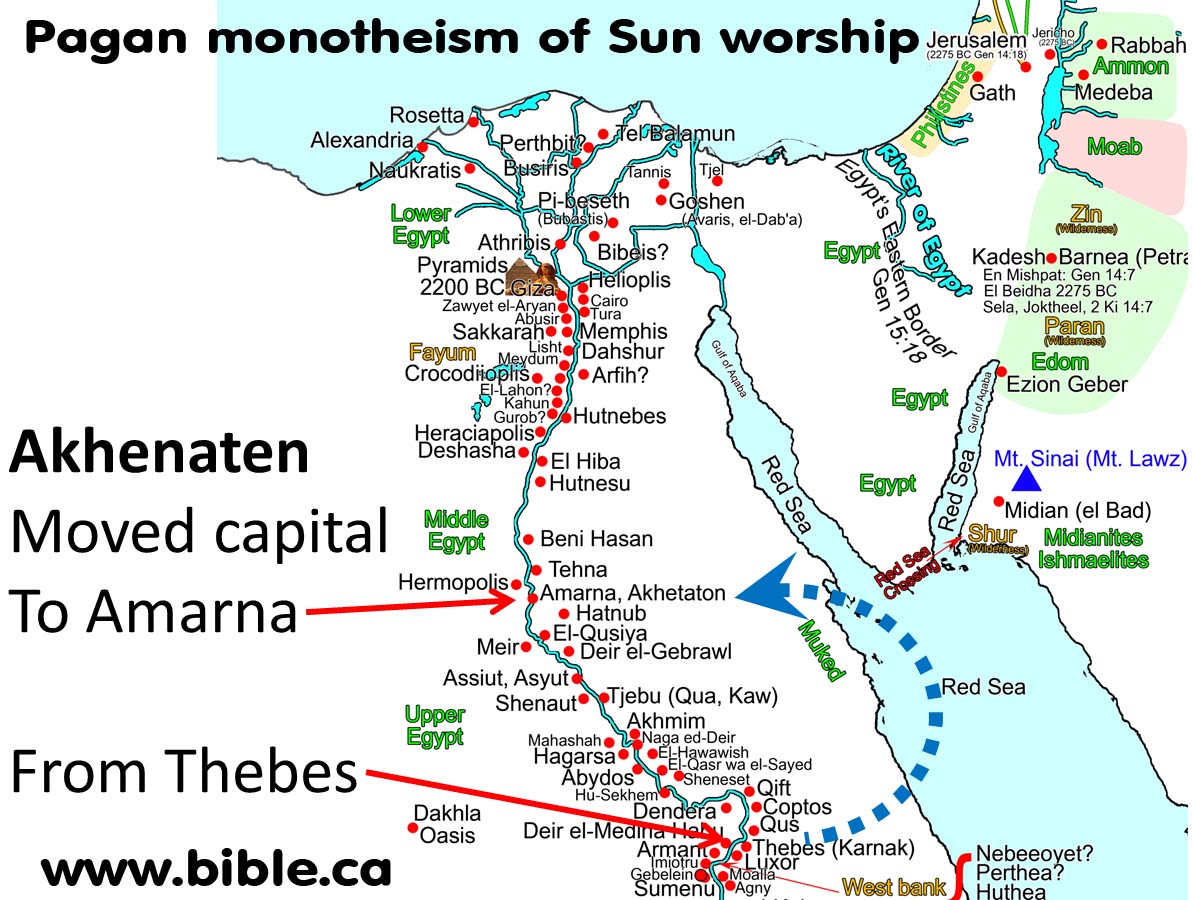
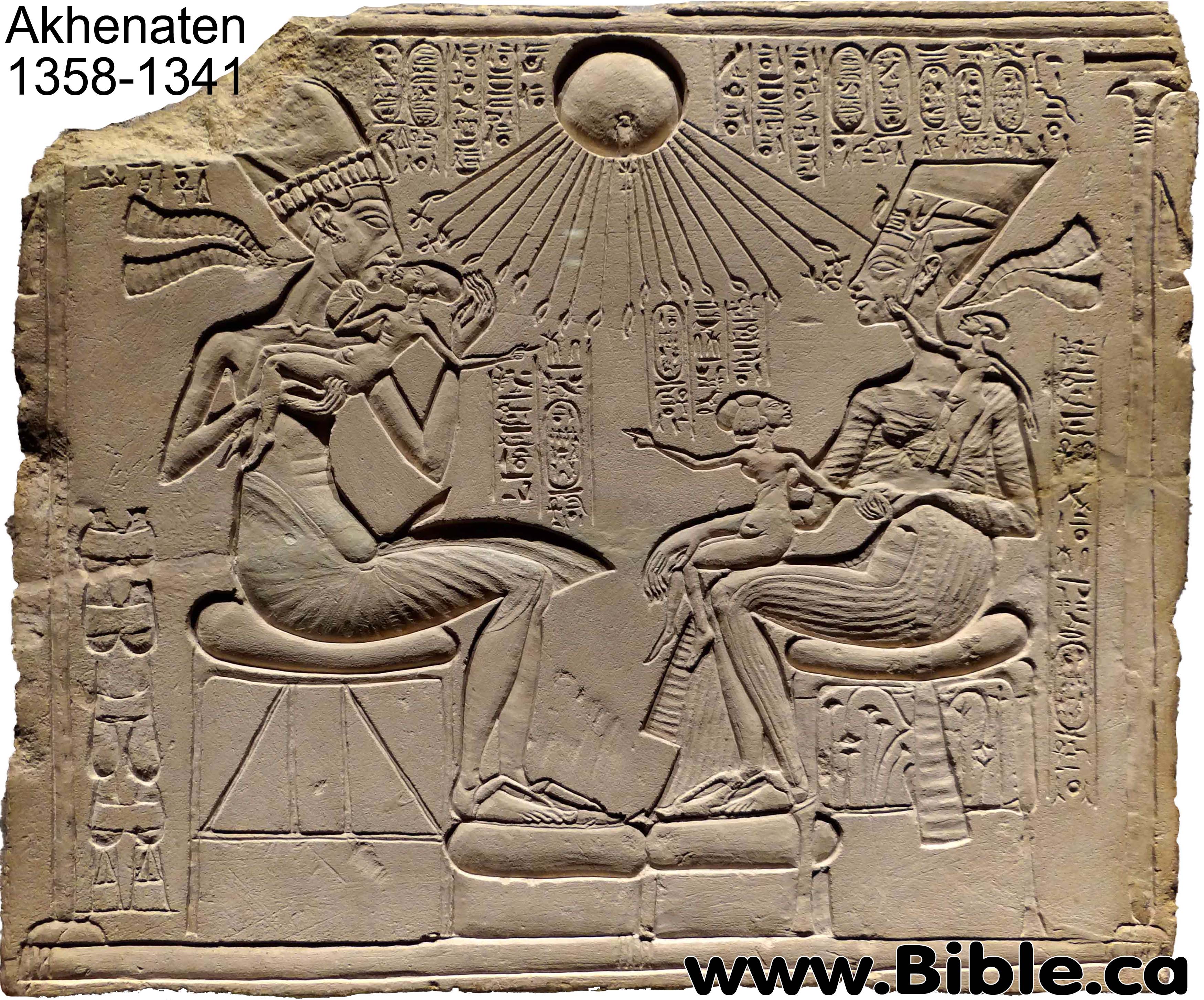
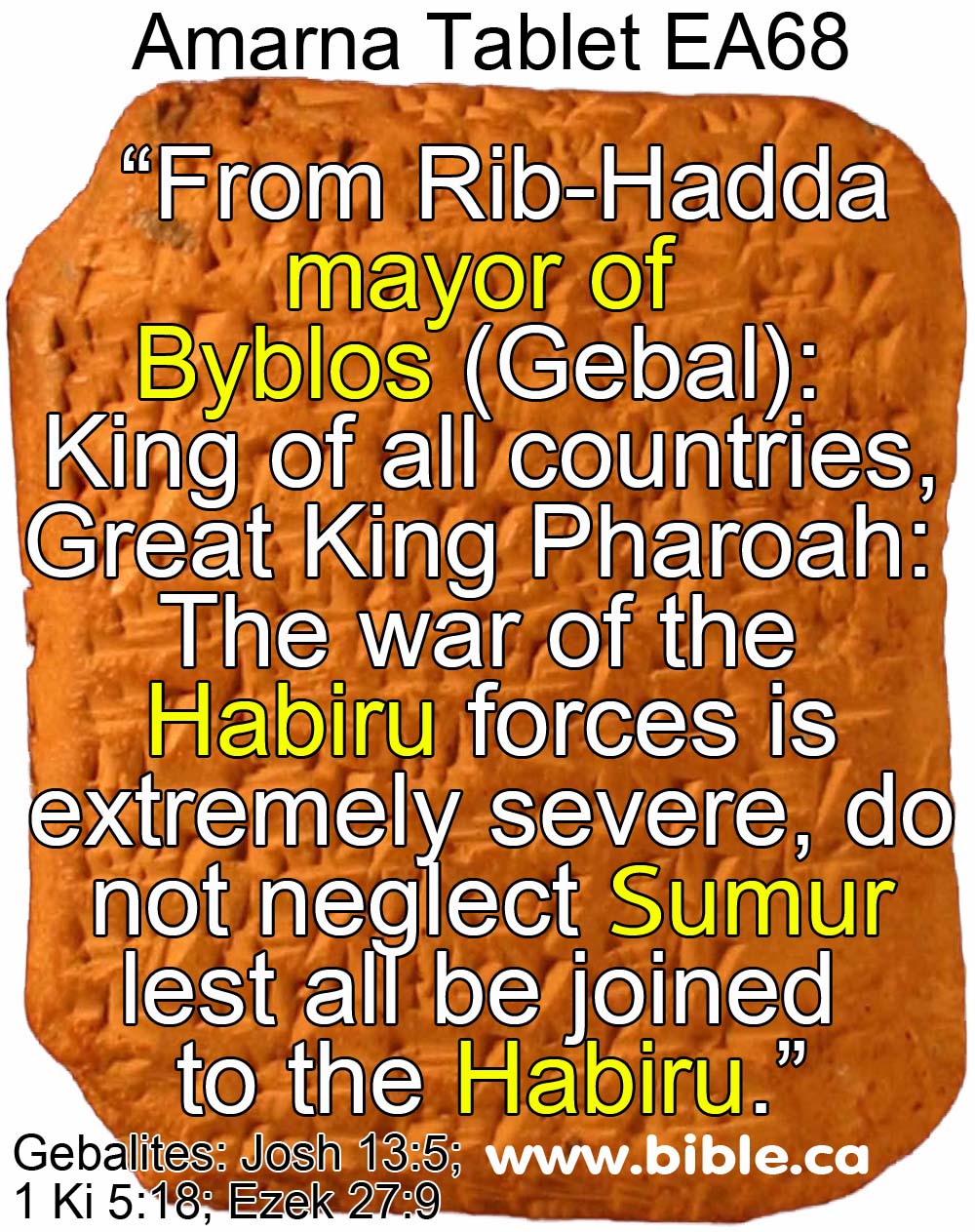

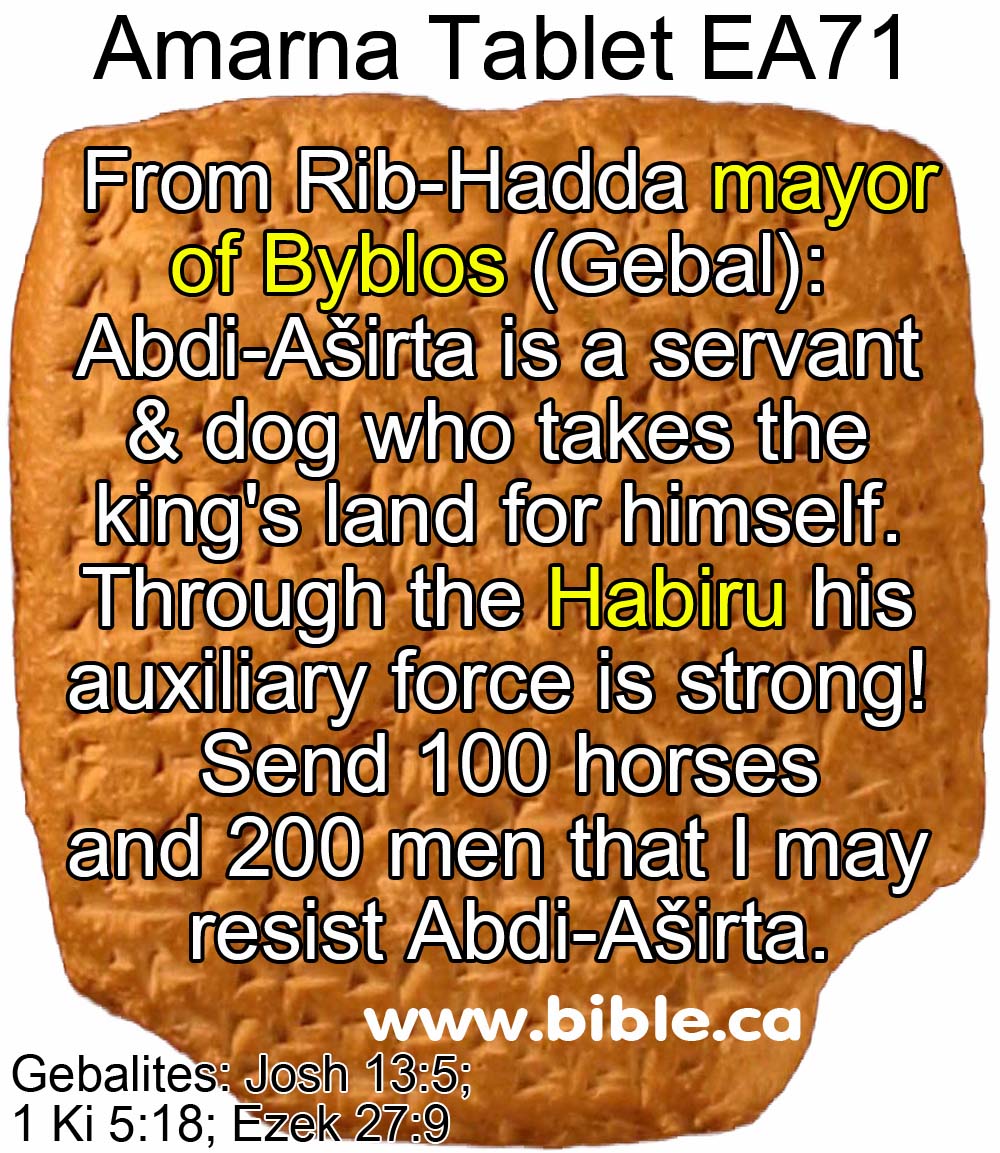
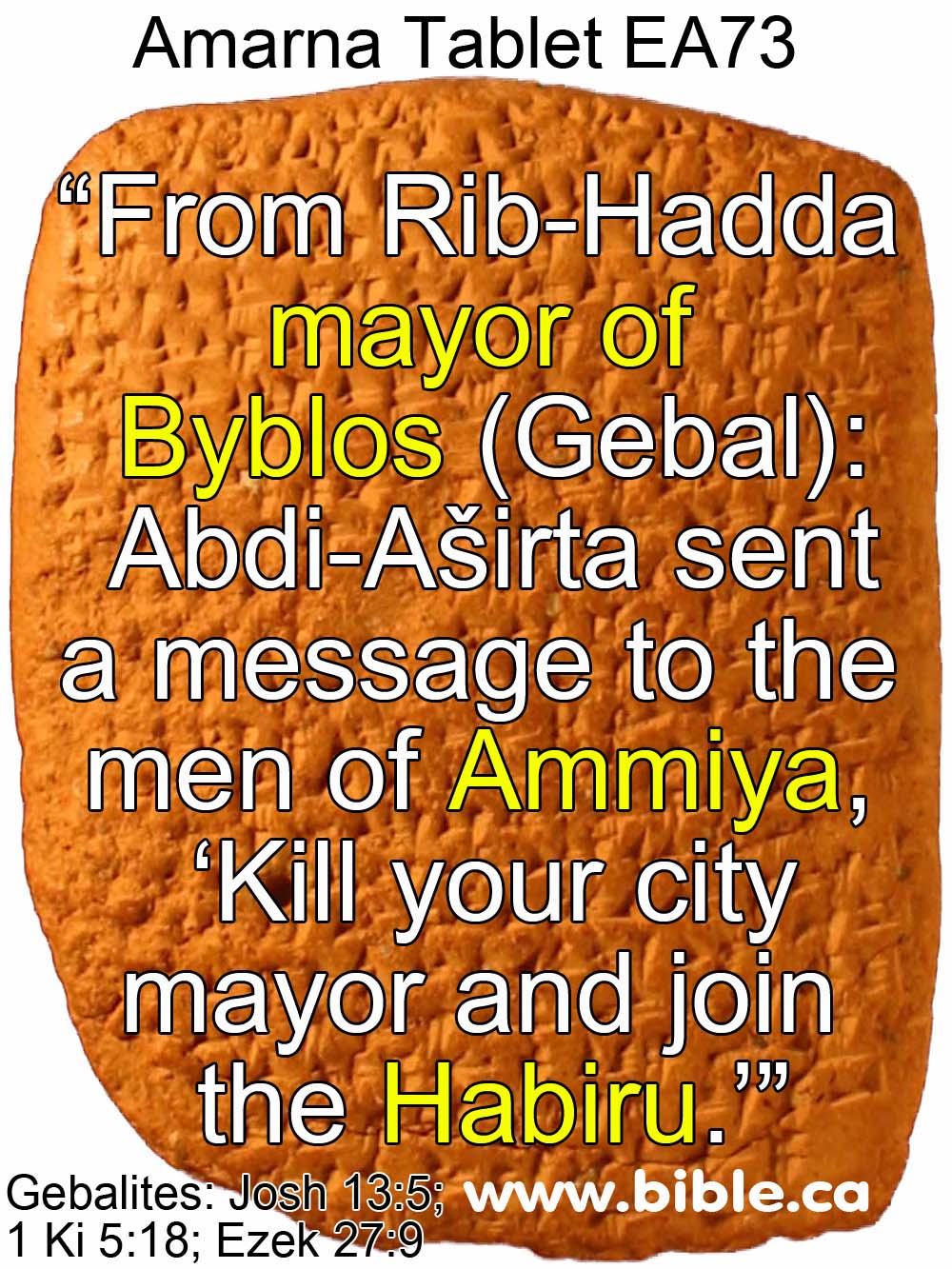

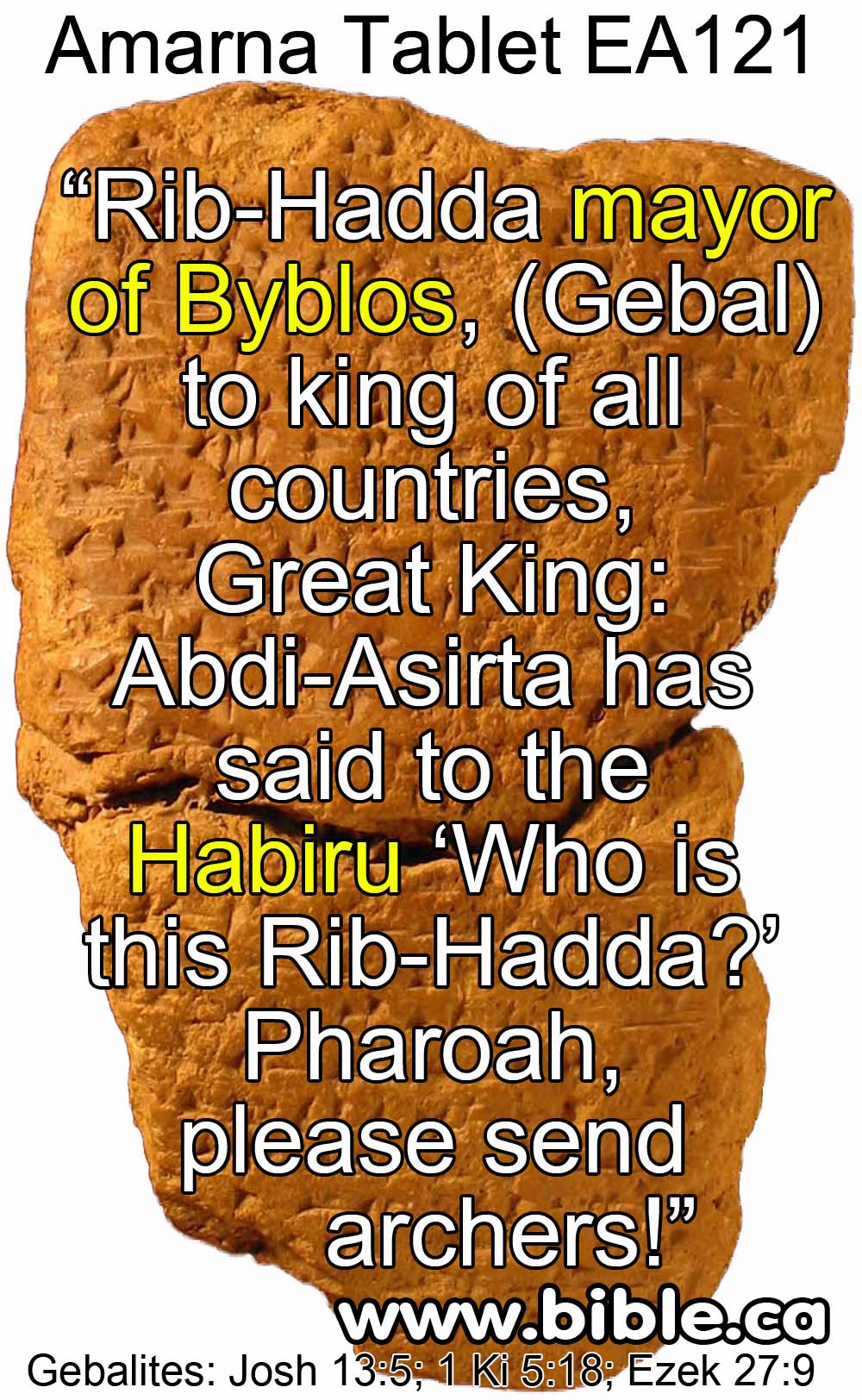
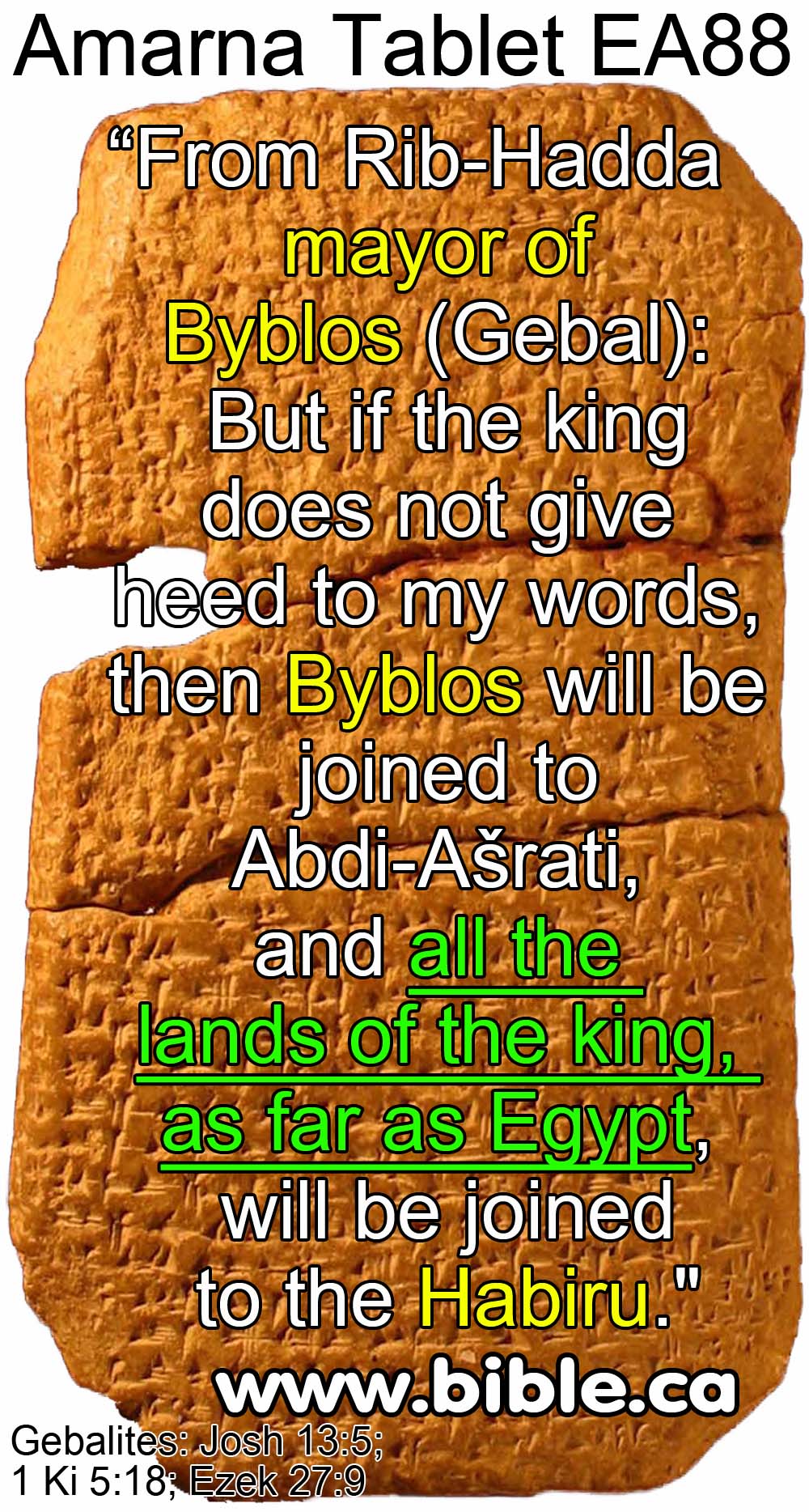


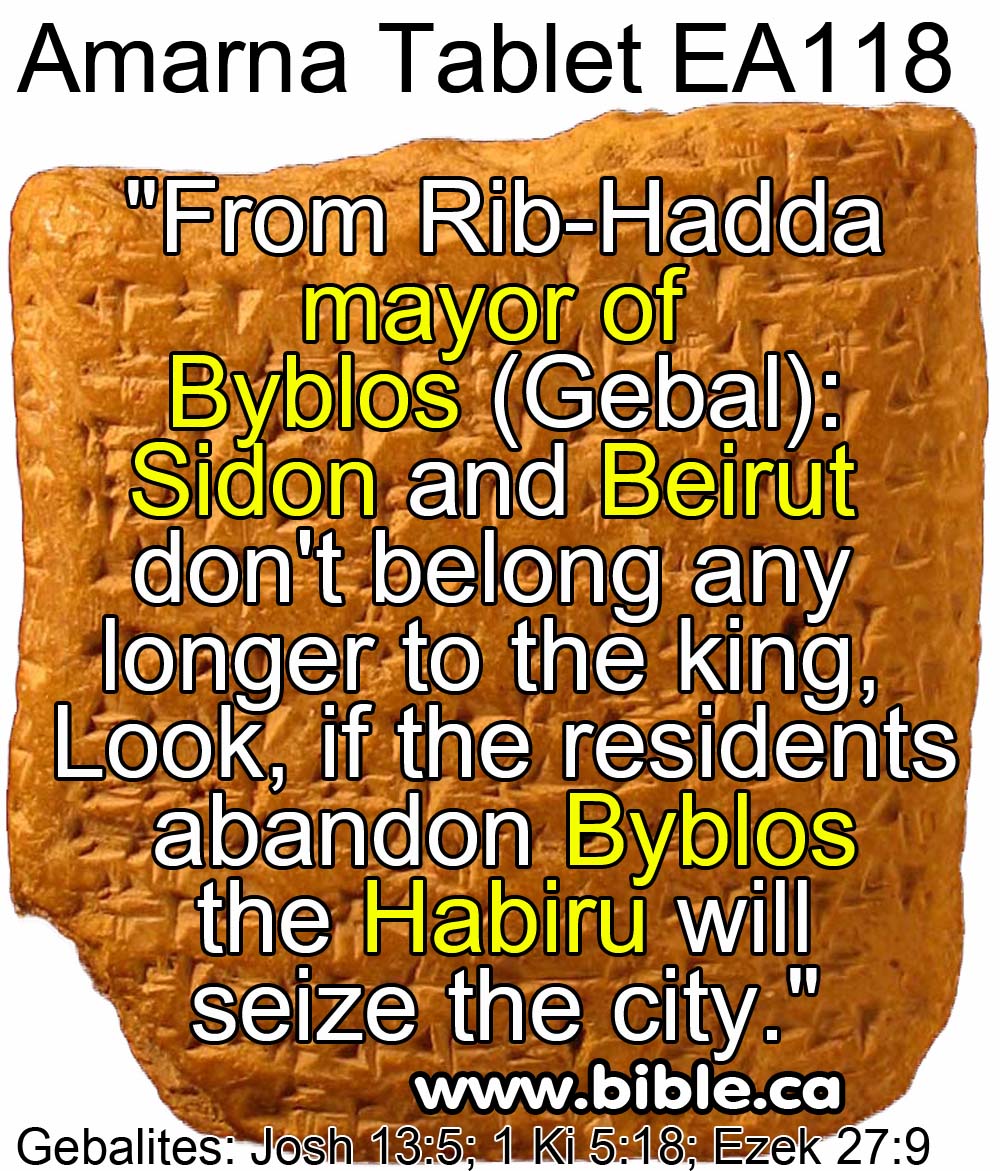
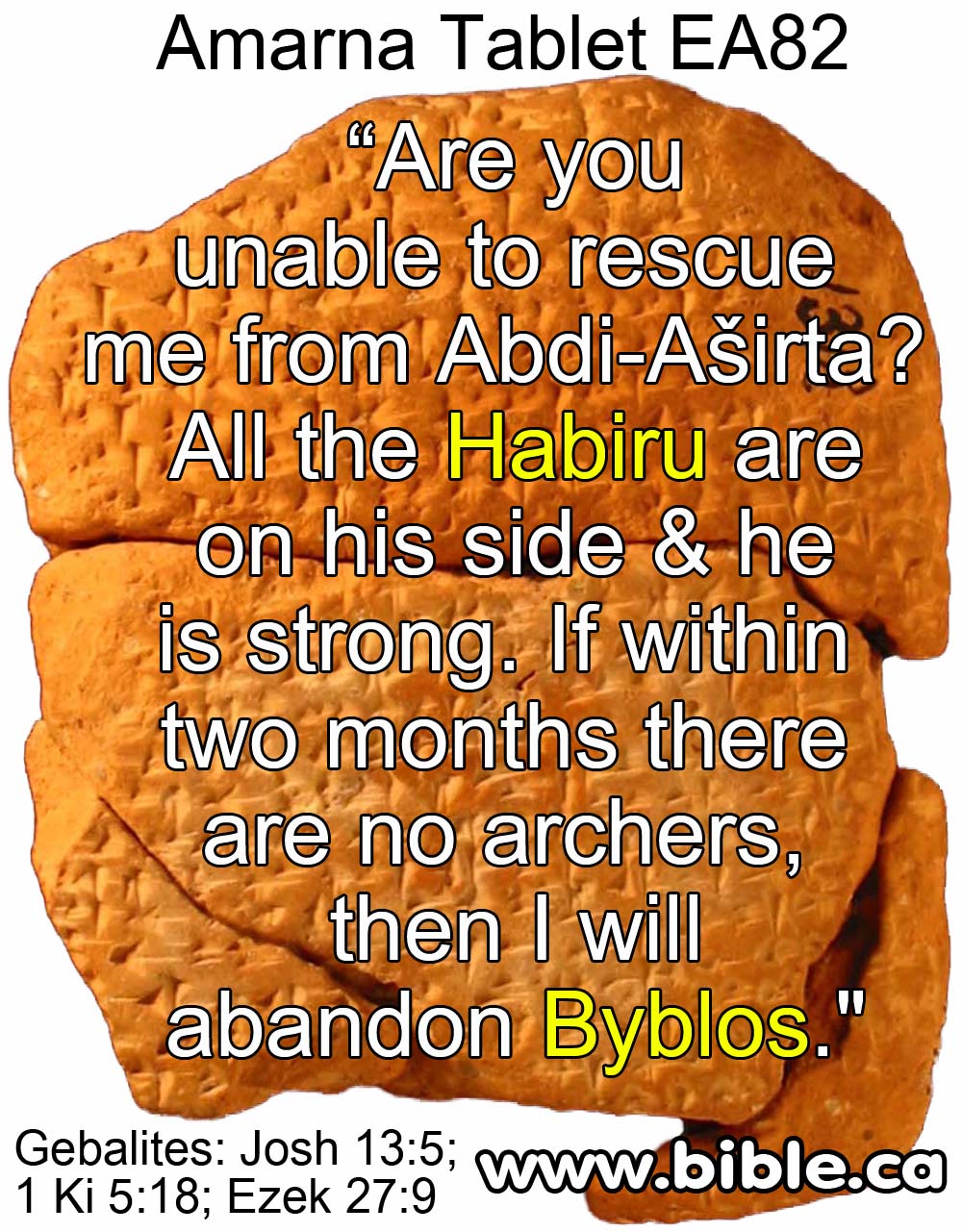

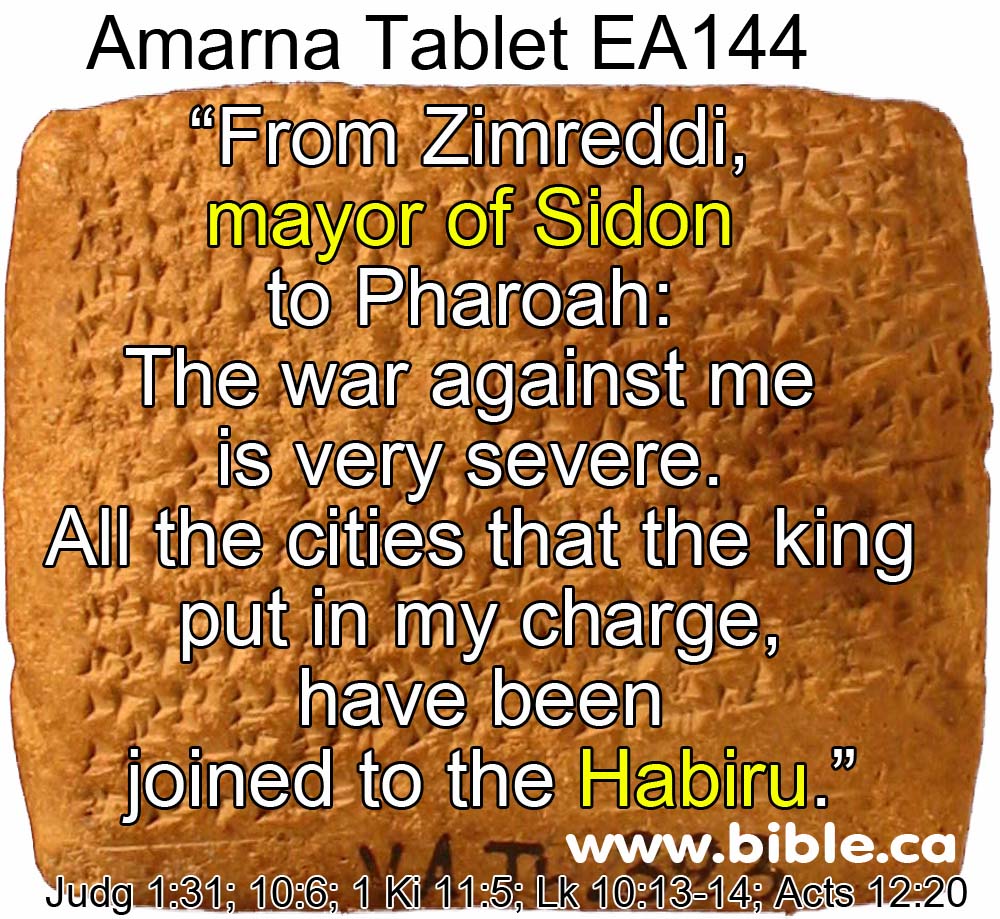
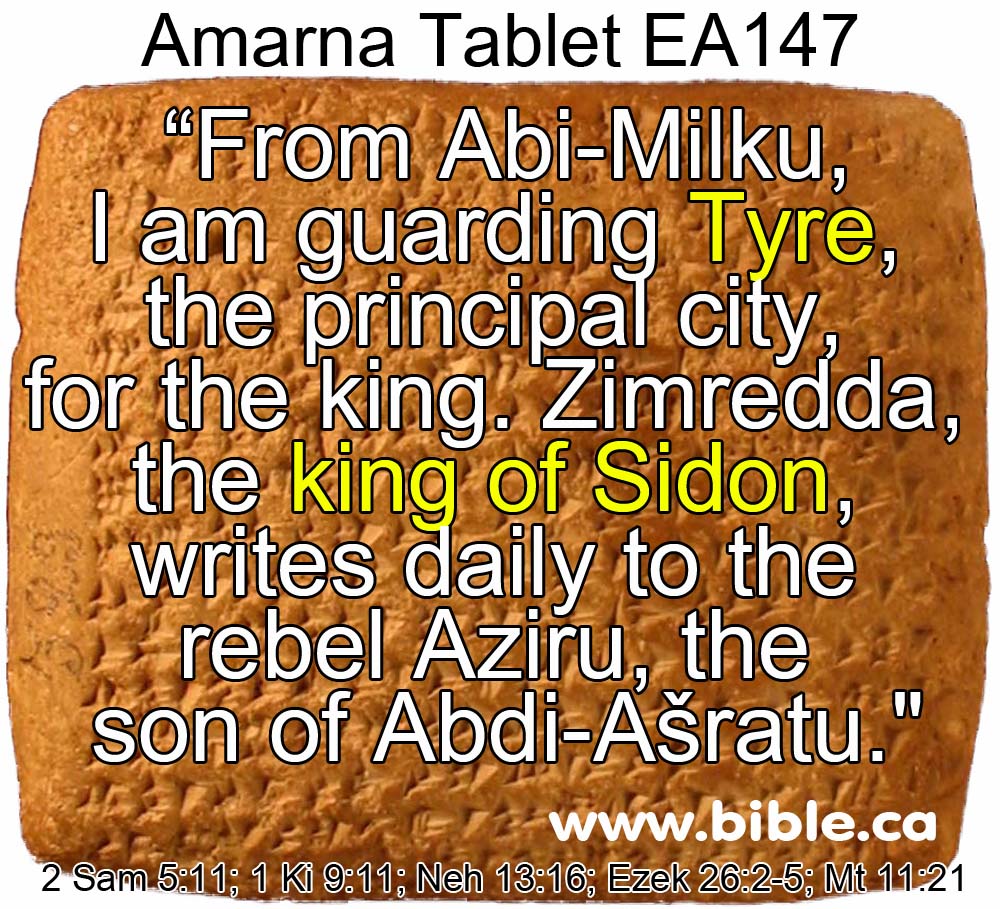
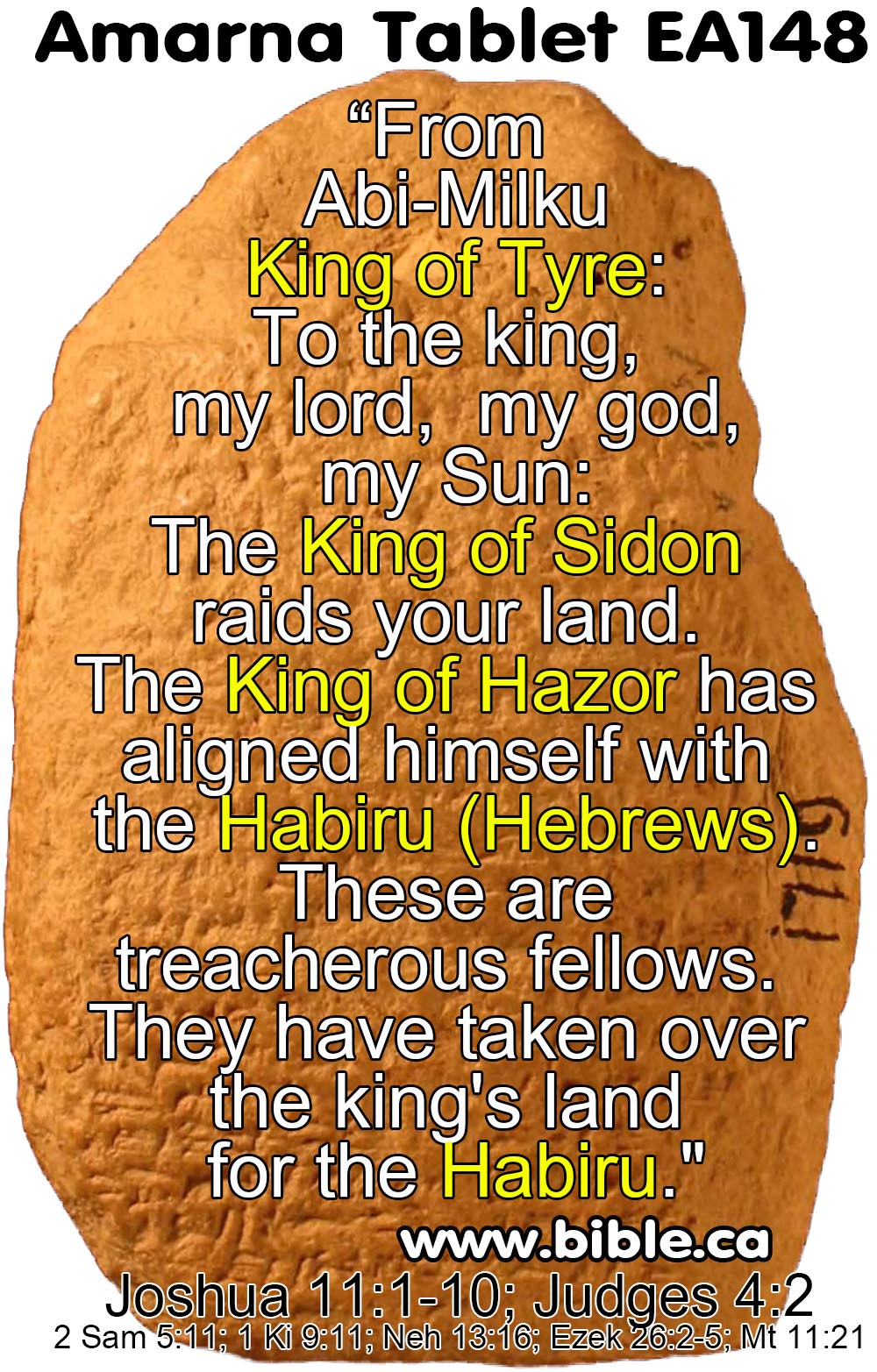

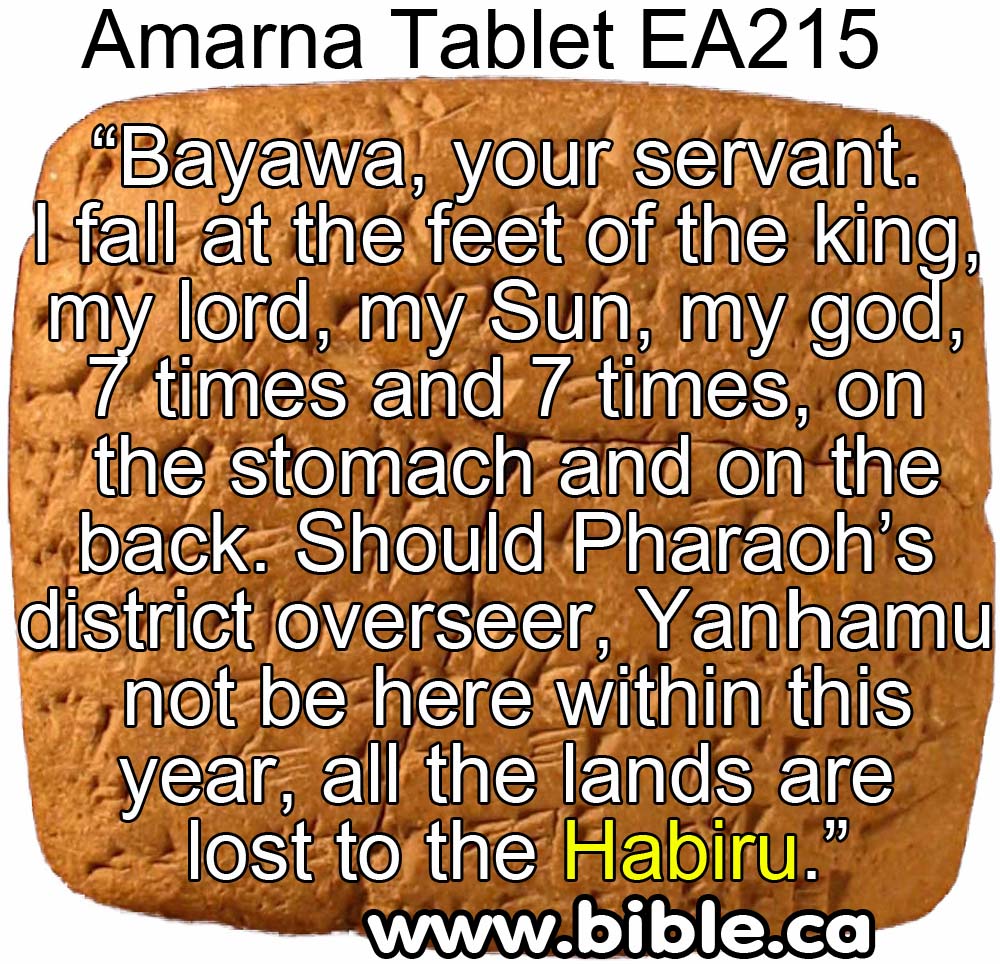
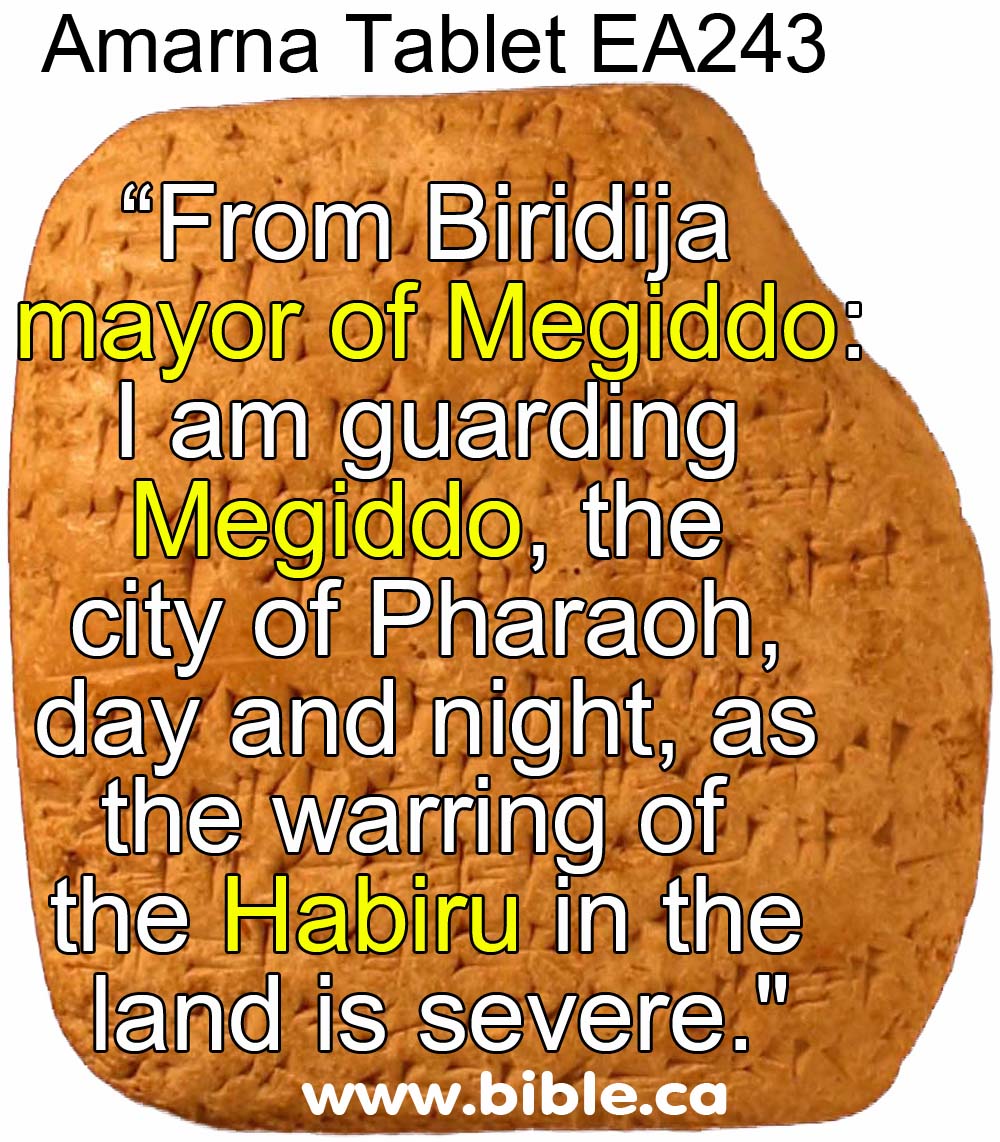
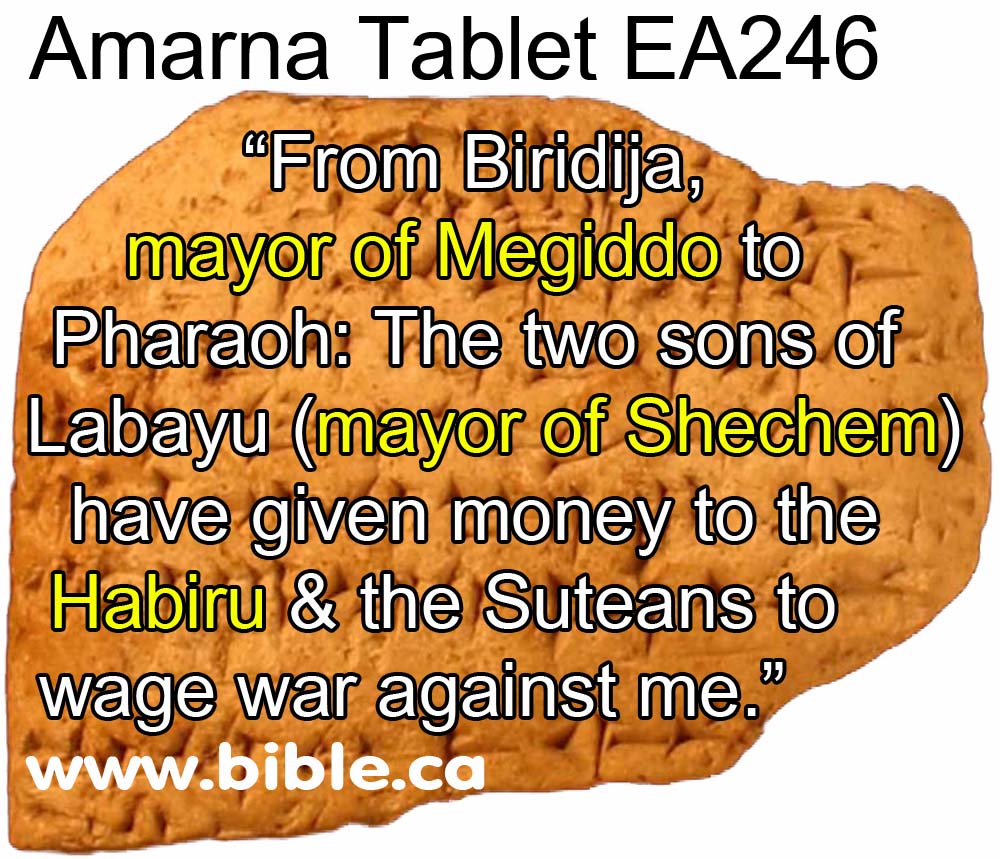
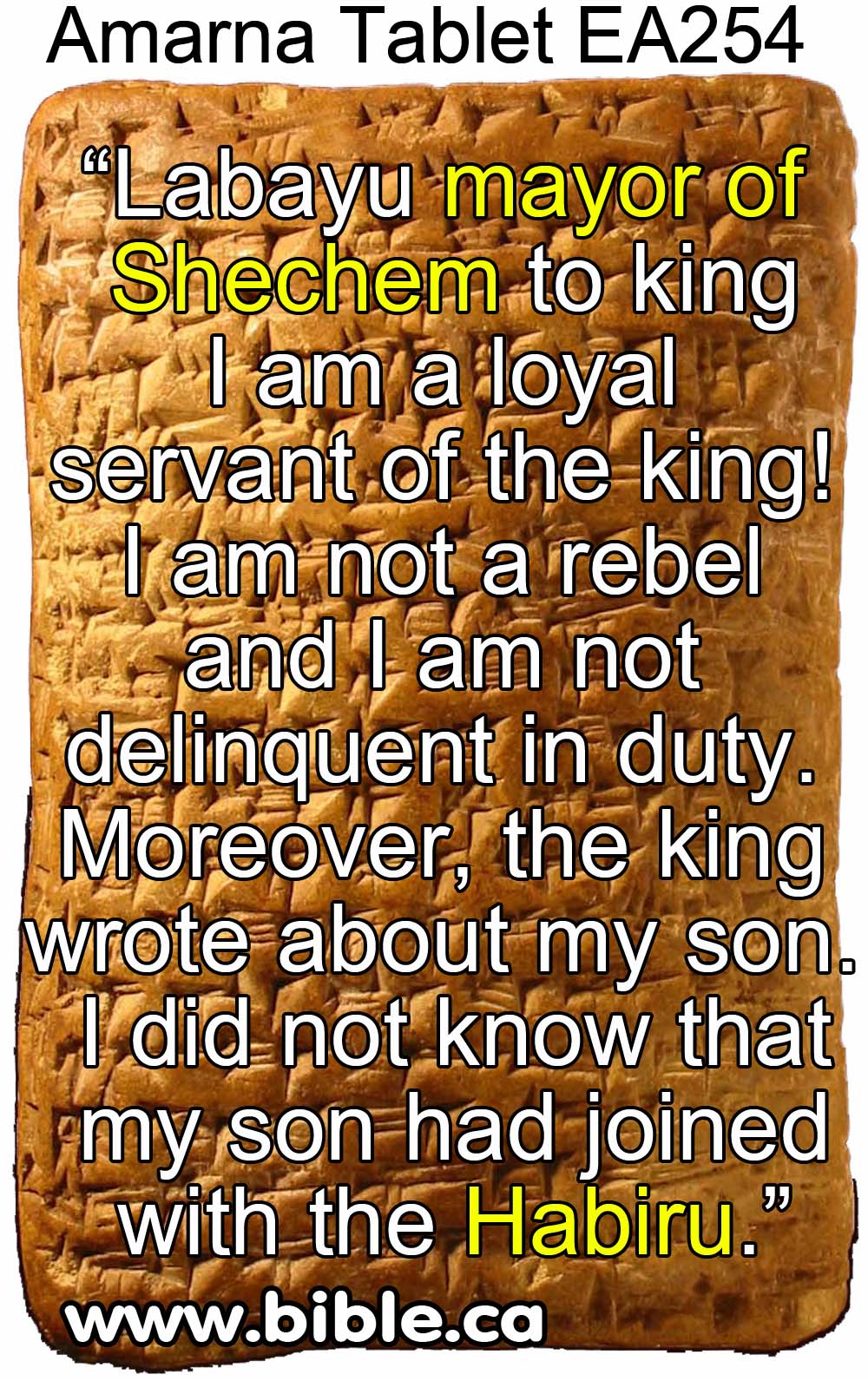
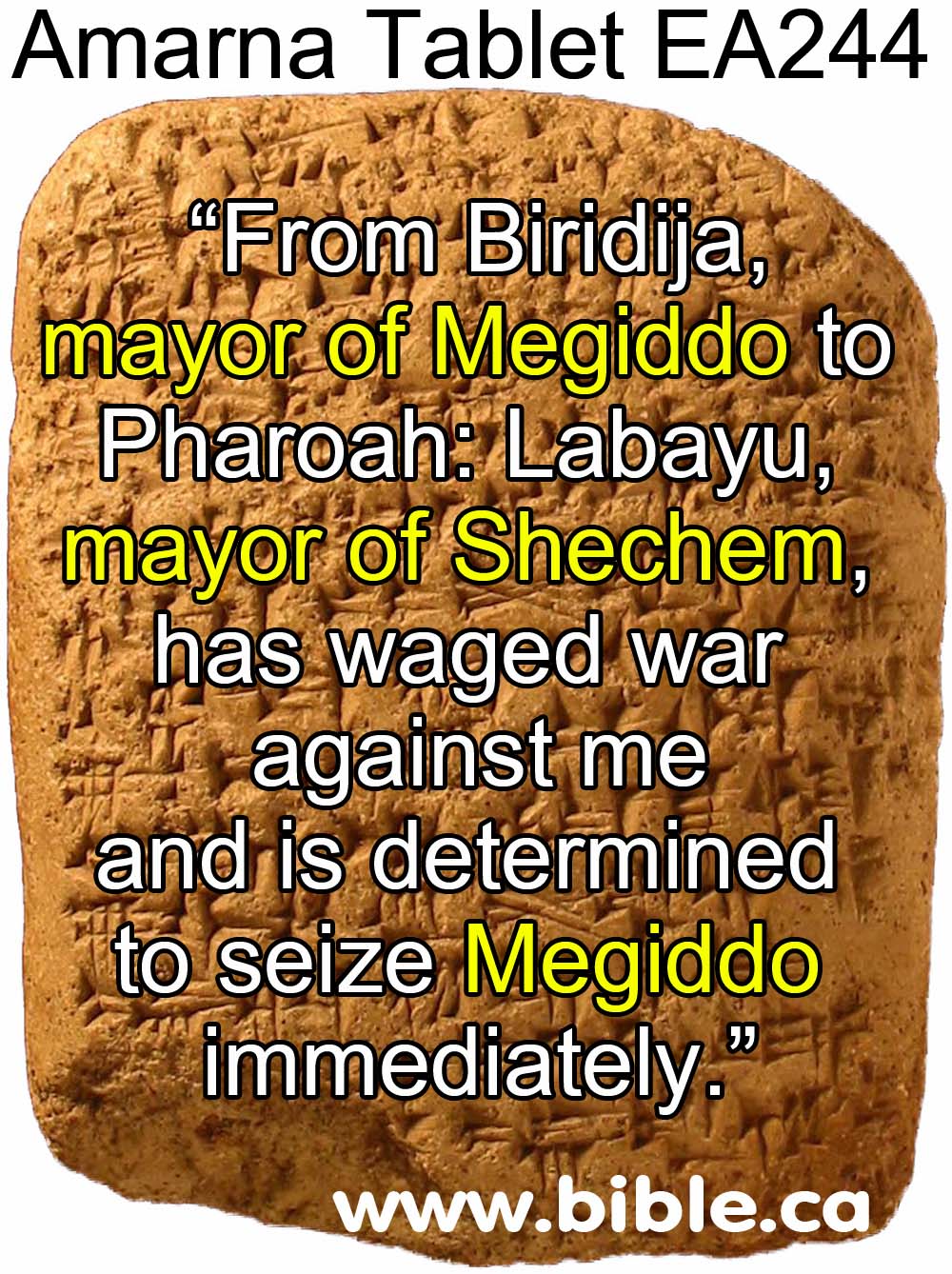
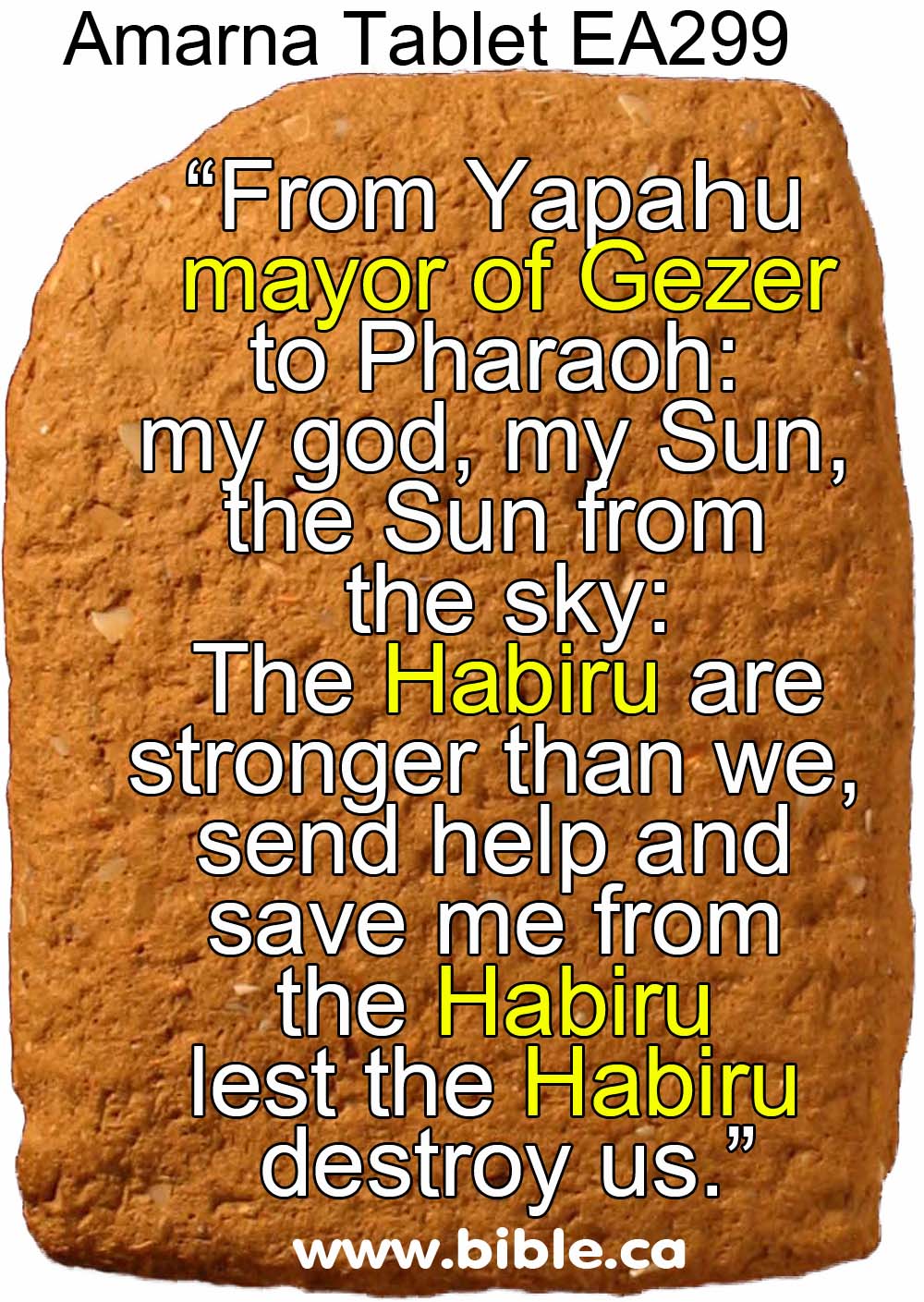

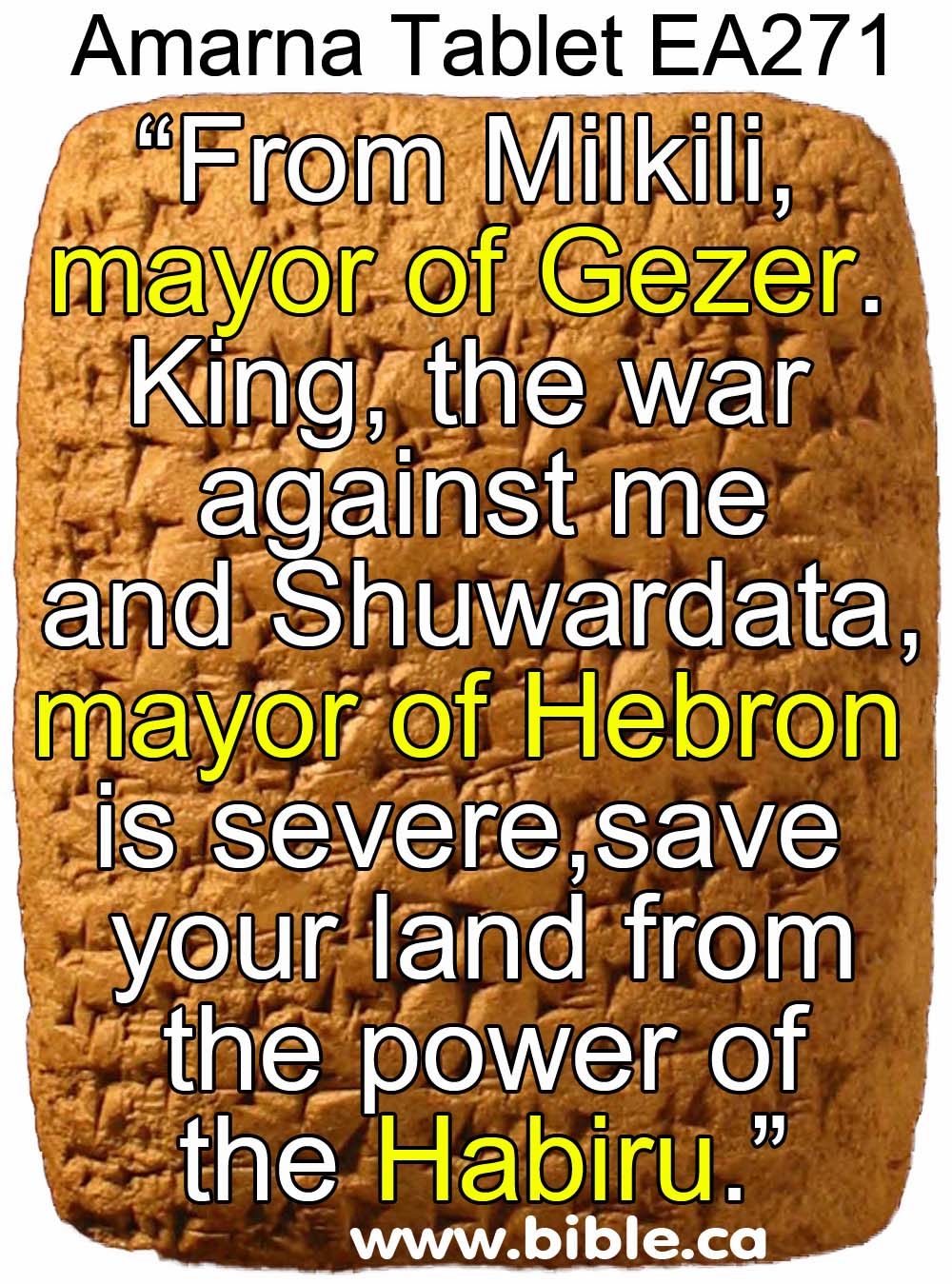
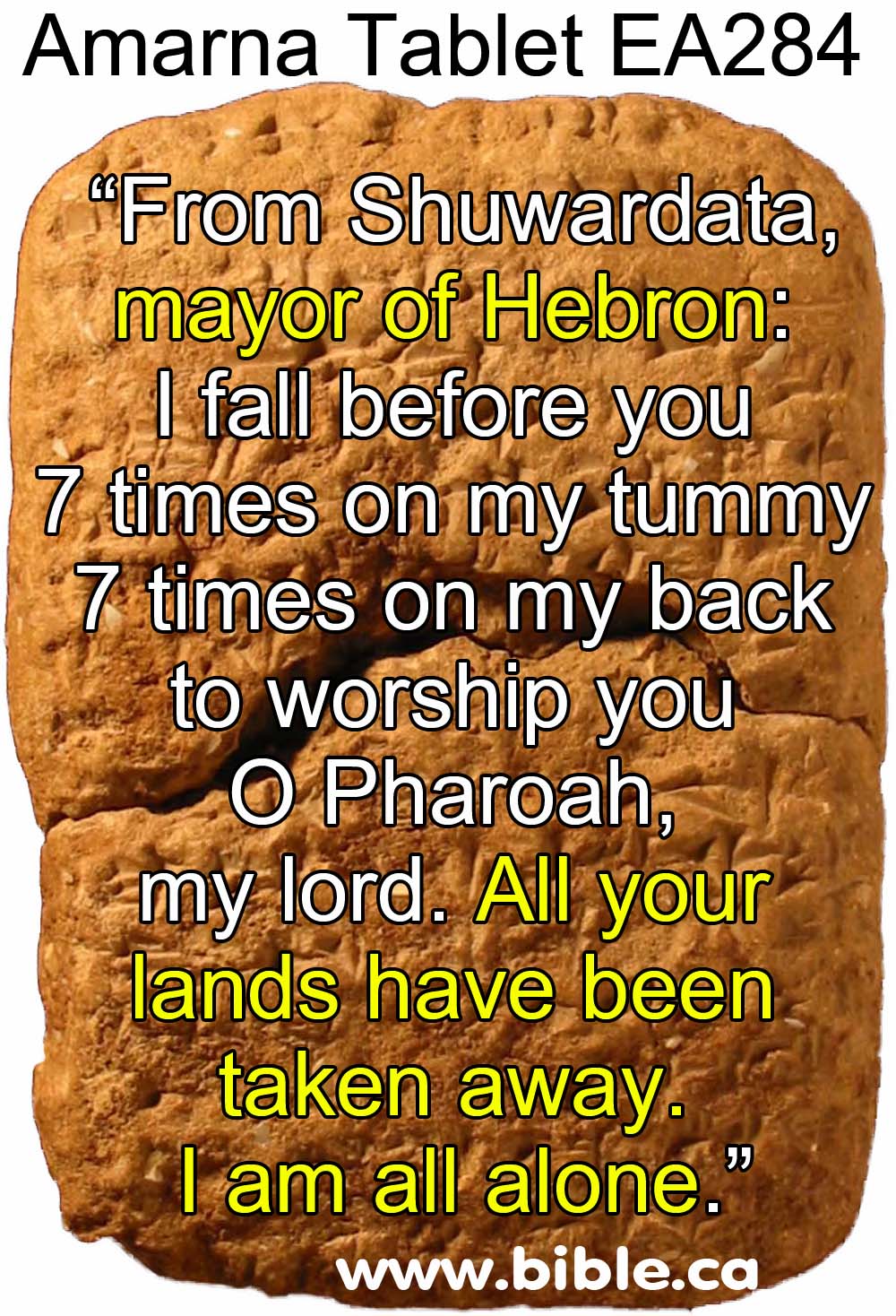
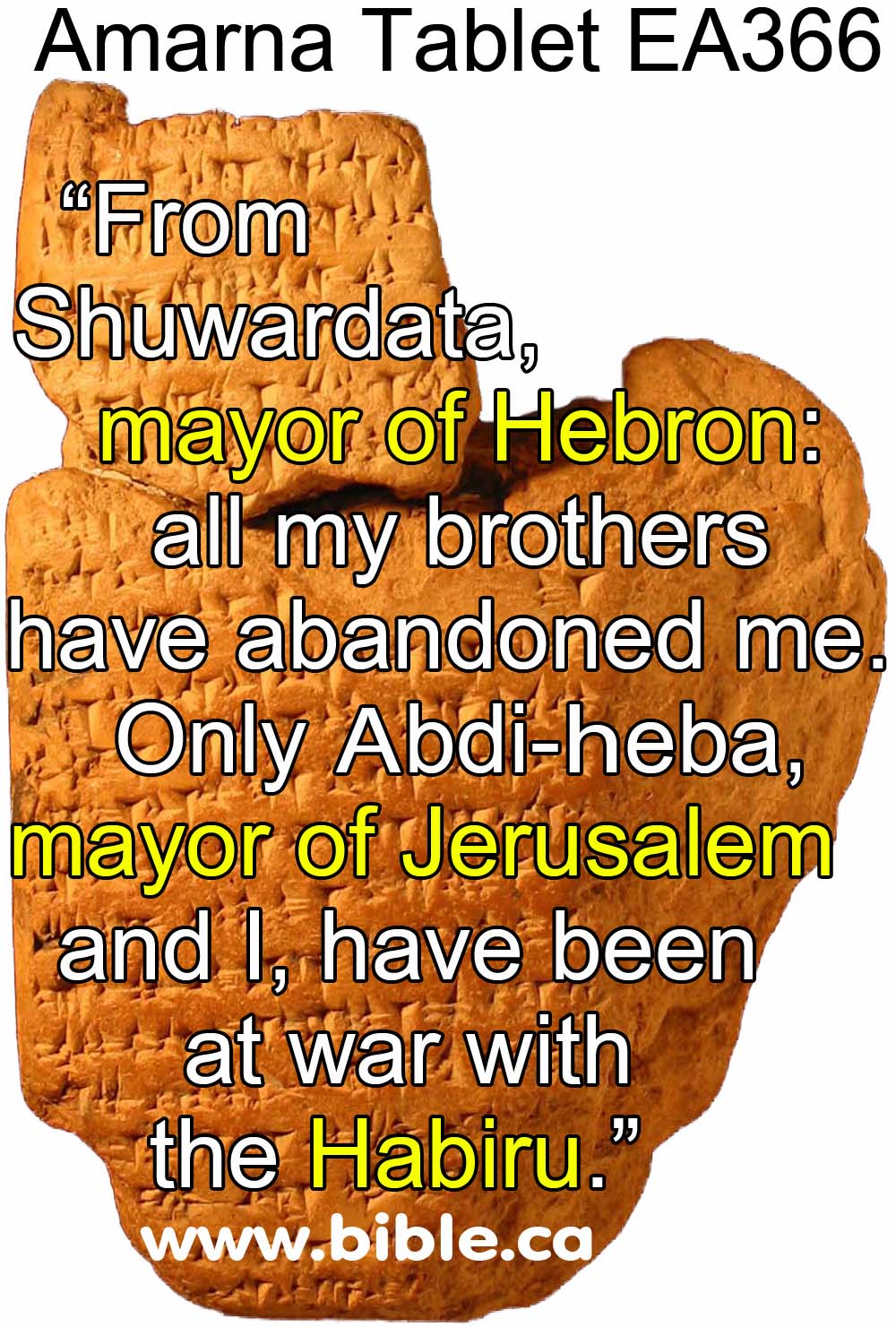
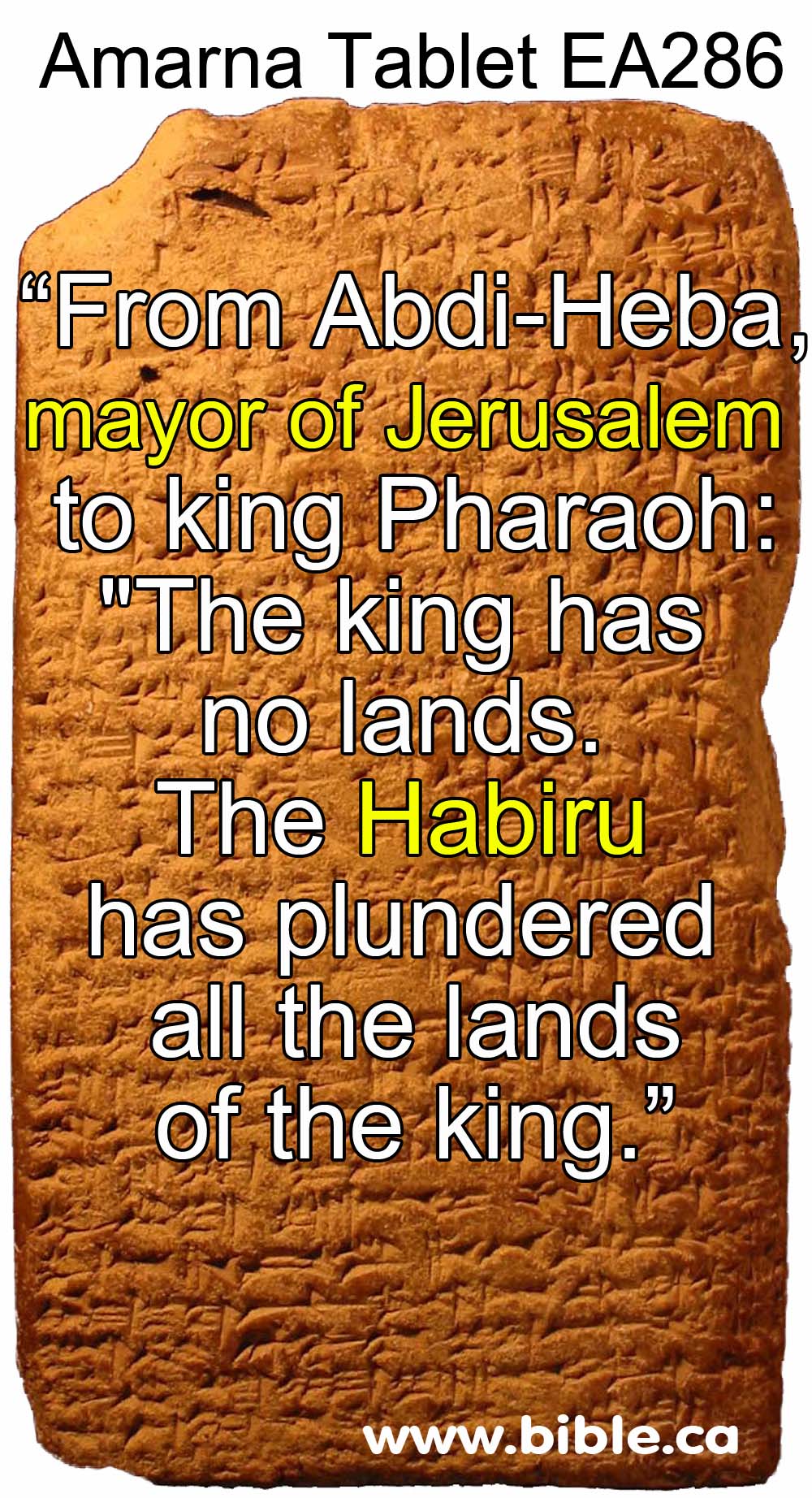
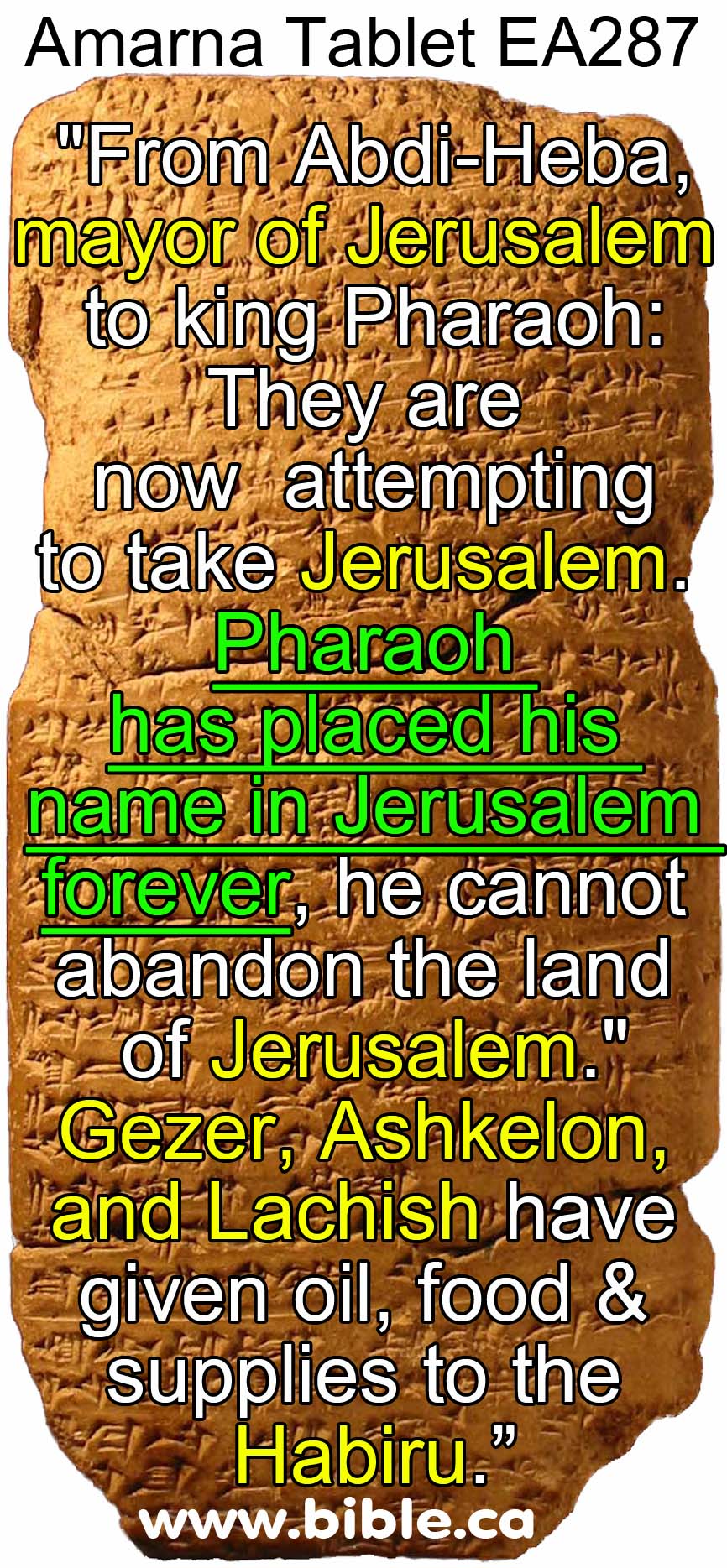
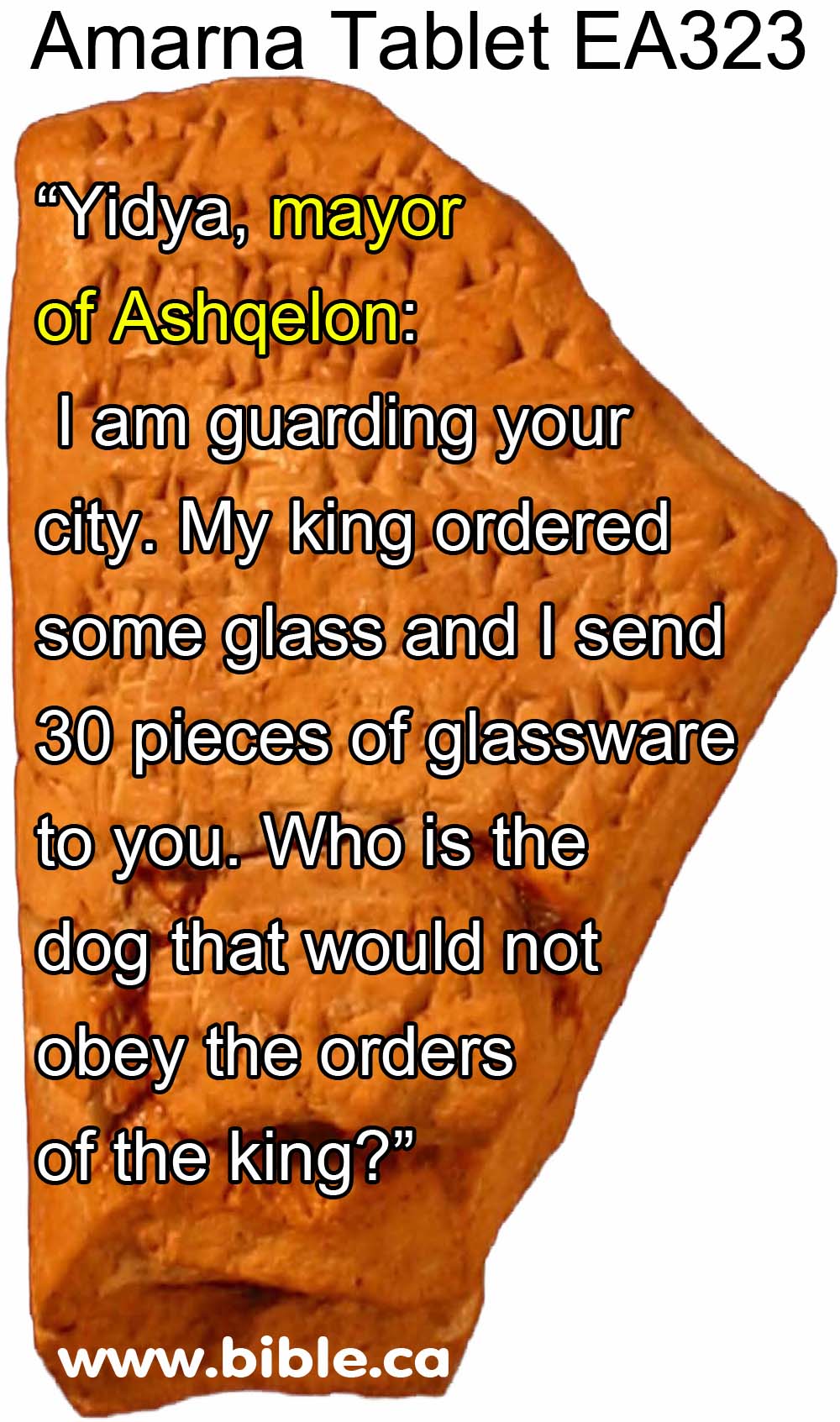
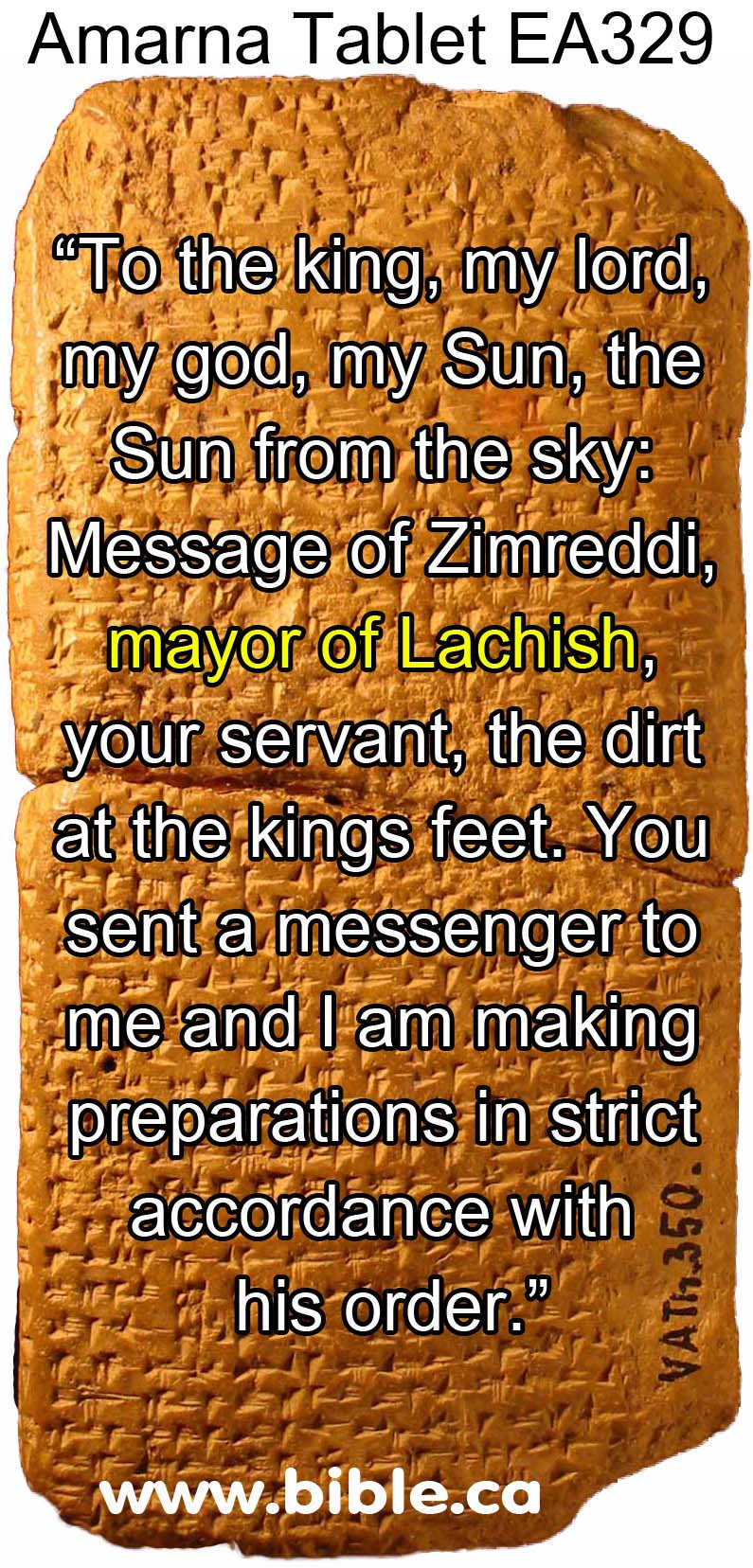
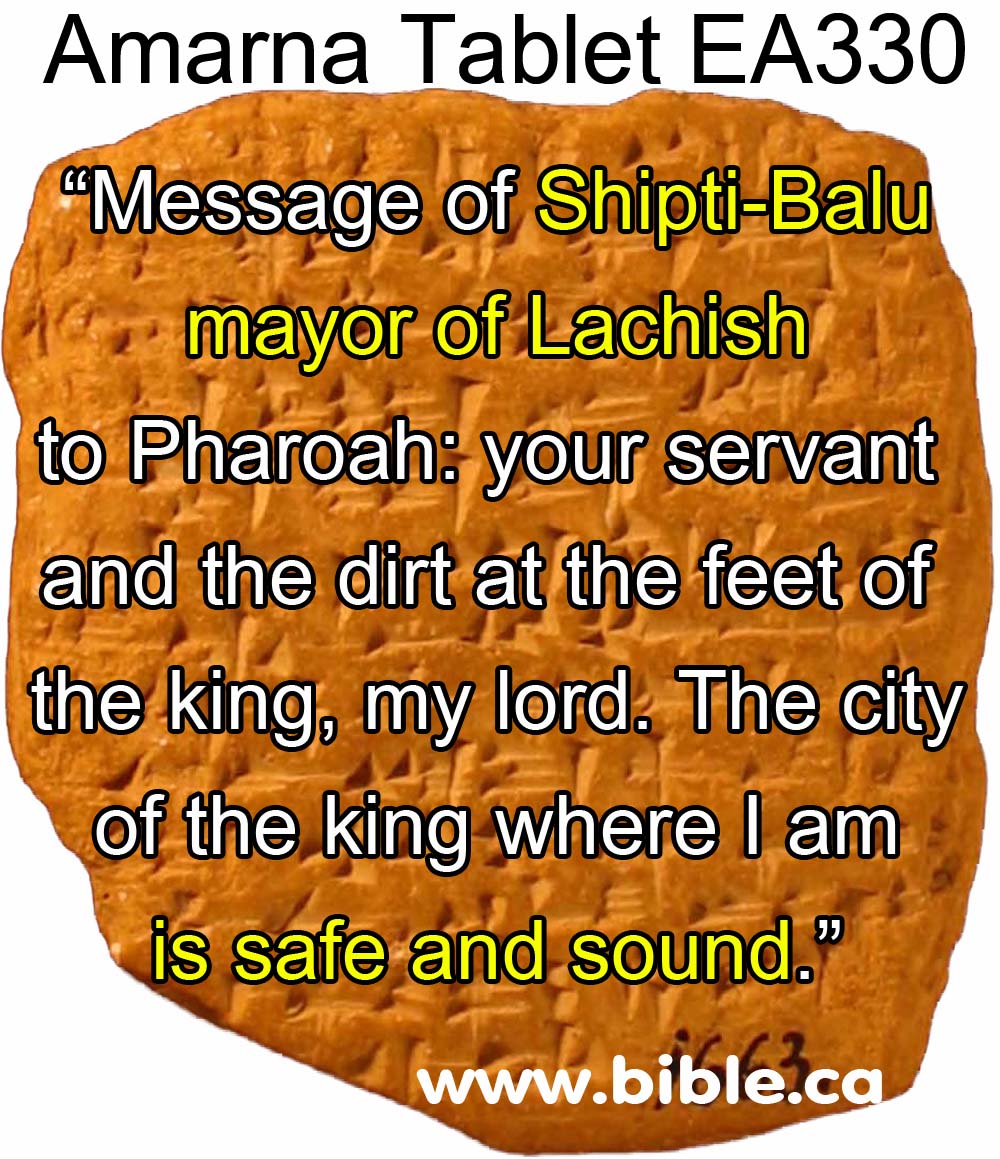
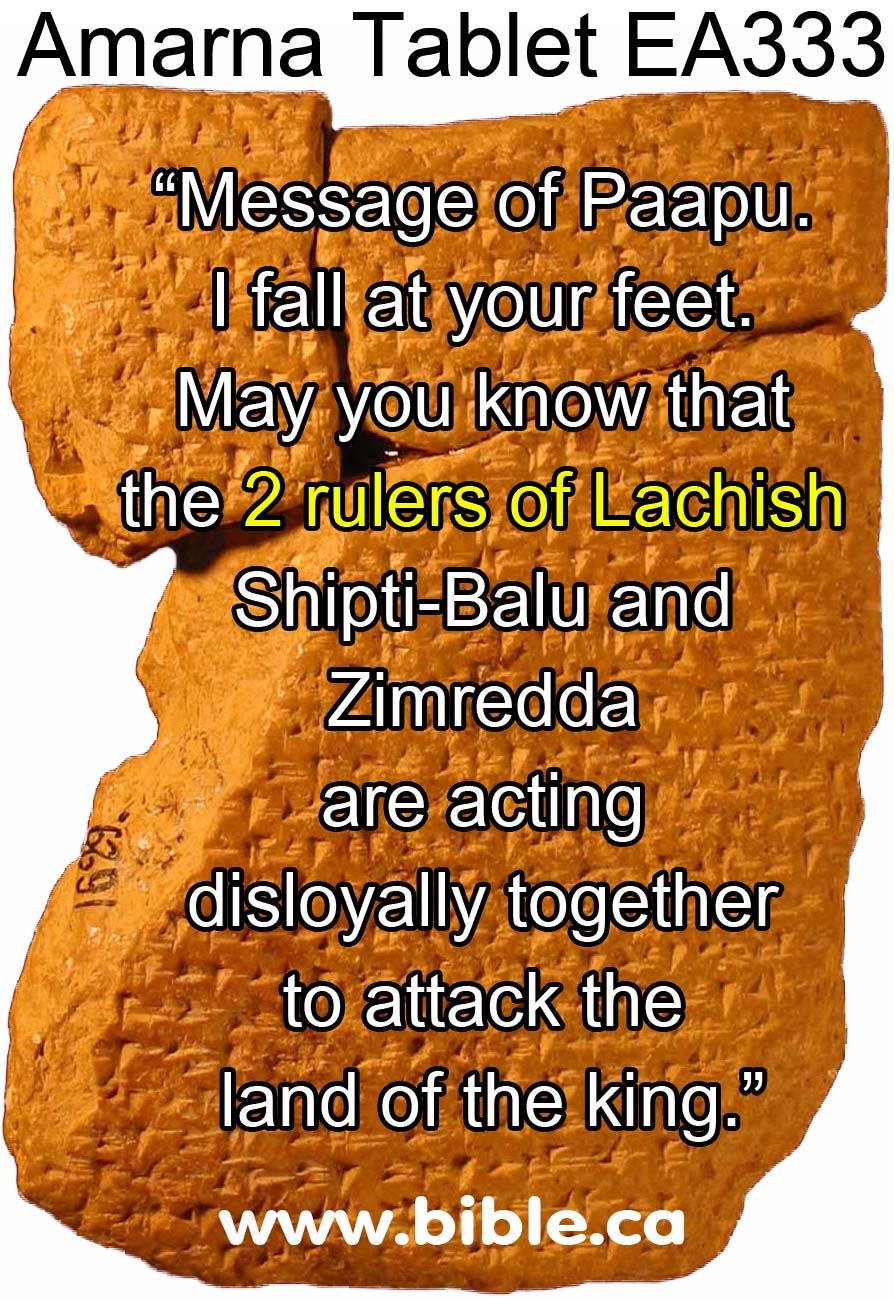
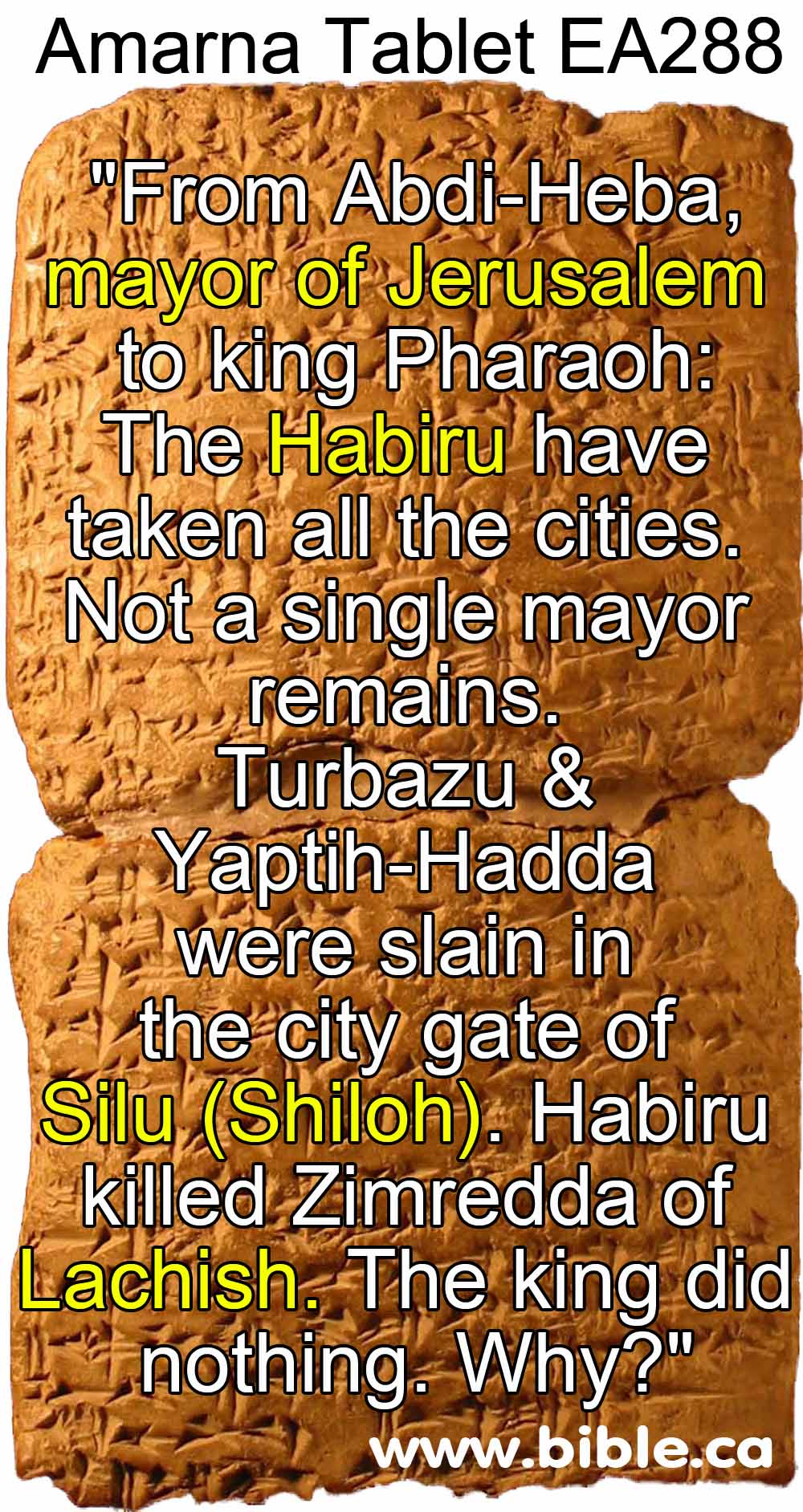
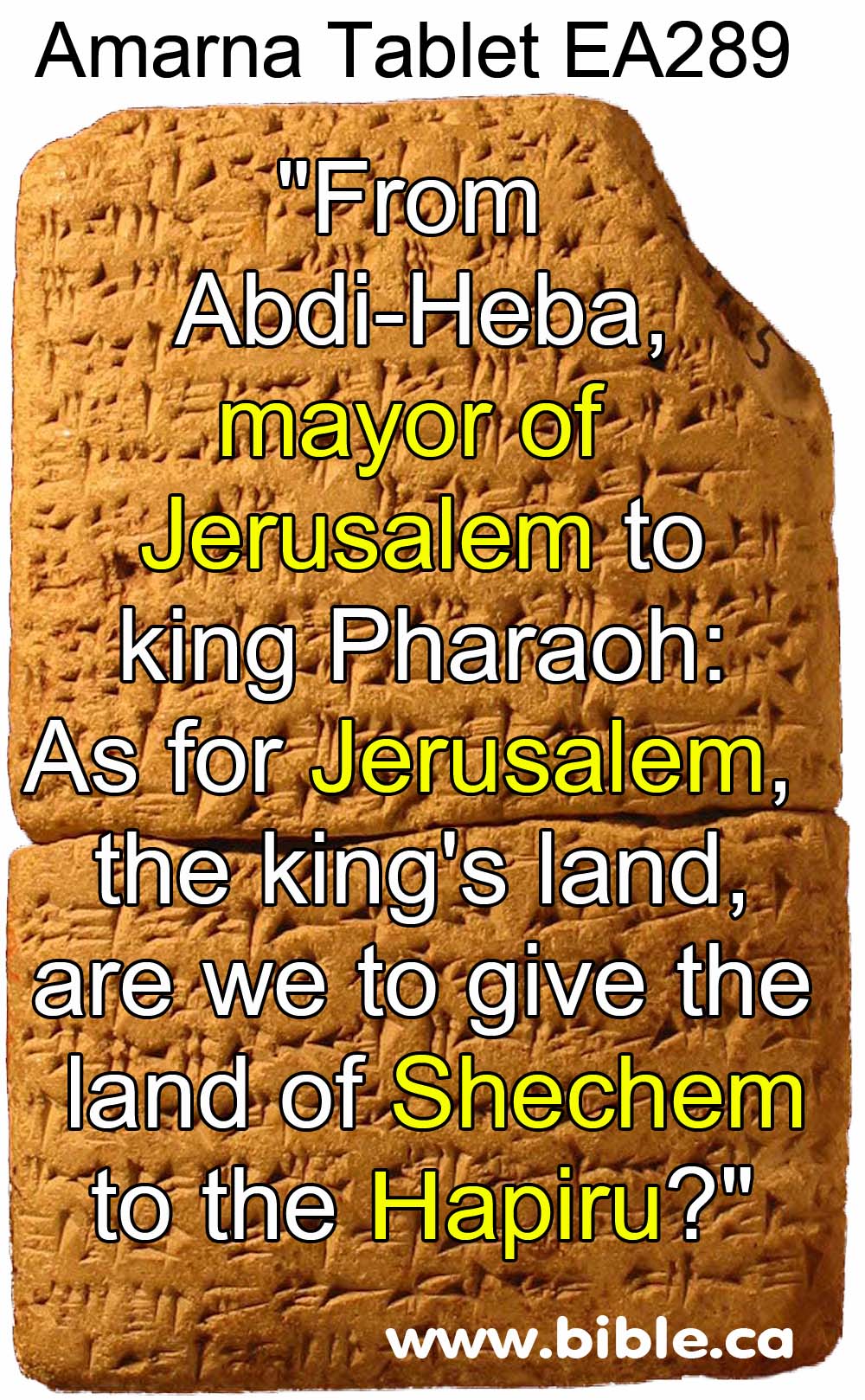
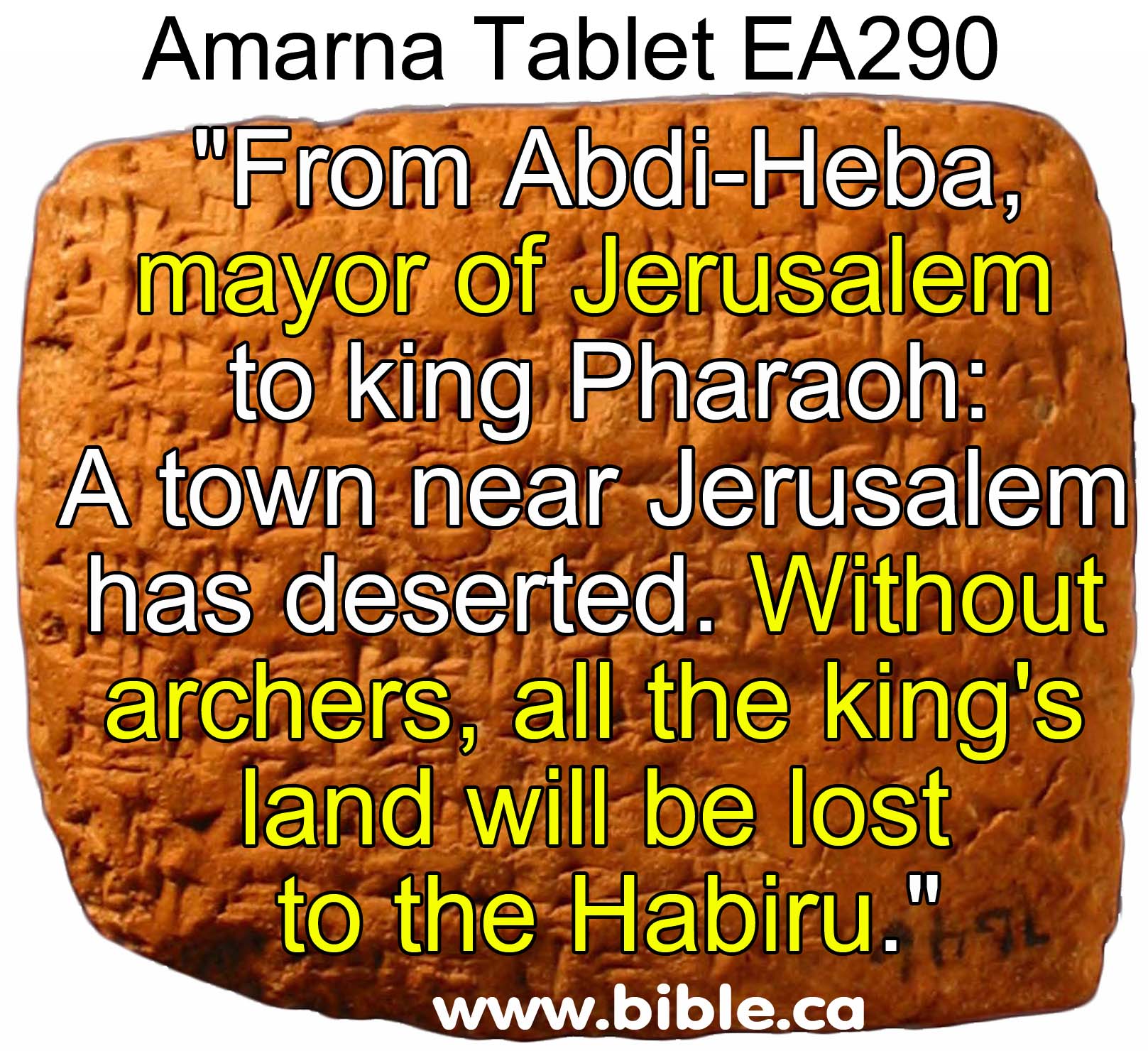
Ok Miguel, The Exodus took place in 1446 BC and the Habiru's people included Hebrews but also other people who left Egypt before the Hebrew's Exodus. I wrote a book (in French) about this topic. It is entitled "Moïse, adoption & exil, les Israélites en Egypte et leur Exode".
ReplyDeleteGreetings.
Jacquy Mengal